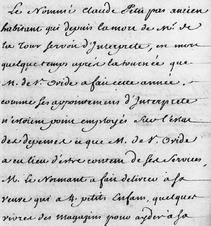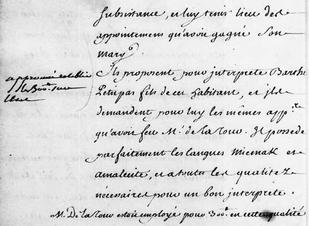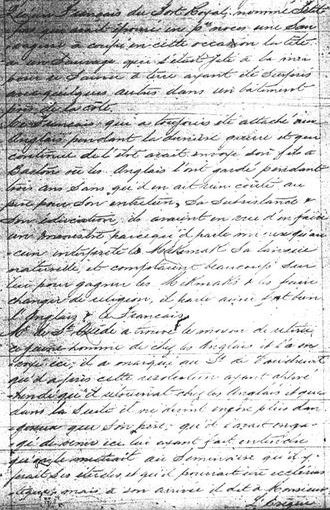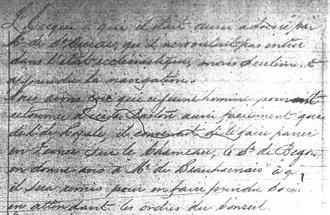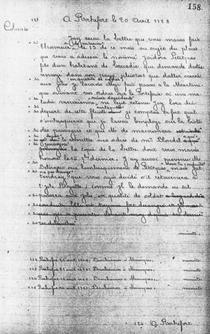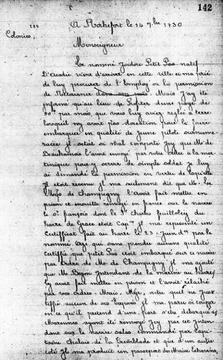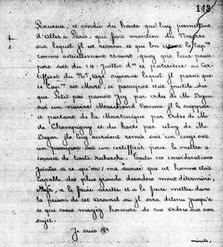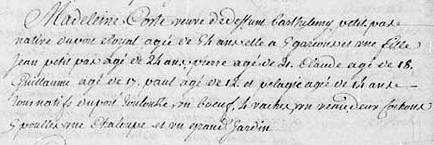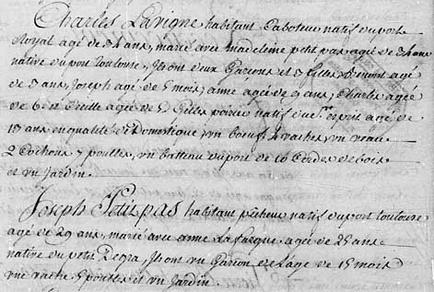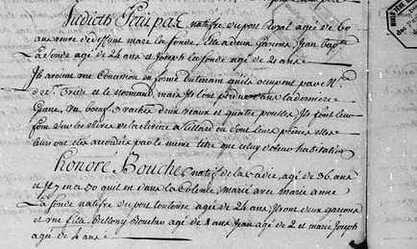Table of Contents
Topic Introduction
Death of Barthélemy Petitpas
Barthélemy Petitpas, William Shirley and The Treaty of Utrecht
Barthélemy Petitpas, William Shirley and The Treaty of Utrecht Continued
Barthélemy Petitpas, William Shirley and The Treaty of Utrecht Continued
William Shirley and Barthélemy Petitpas Continued
The How and When of The Petitpas' as Interpreter for The Indians
Father Maillard's Account of Barthélemy Petitpas' Death
Barthélemy Petitpas' Biography and The Year 1722
Barthélemy Petitpas was Mistaken for Someone Else
Emma Lewis Coleman and The Petitpas' Biographies
Claude Petitpas II in his Biography was Mistaken for Someone Else
Collection de Manuscrits Relatifs à la Nouvelle-France (CMRNF) Vol. III Continued
Claude Petitpas II was Mistaken for Someone Else Continued
Claude Petitpas II’s biography Continued – The Mi'Kmaq Question Considered
Claude Petitpas II and Sons Living Under English Domination
Claude Petitpas II and Sons Living Under French Domination
No Evidence Found That Barthélemy was a Guest of The English
Stories About Les Nommés Petitpas
Barthélemy Petitpas' Biography Research Continued
Identifying The 1722 Young Petitpas & Two of His First Brothers
Identifying The 1722 Young Petitpas & Two of His First Brothers Continued
More about Full Brothers Isidore, Joseph & Paul Petitpas
Fate of the Full Brothers Isidore, Joseph & Paul Petitpas
Substantial Errors and Omissions in Les Nommés Petitpas Biographies
Short Summary to Salute Claude II's and His Eldest Son Barthélemy's Lives
Sketch of Area Back Then
Source
Other Internal Pages on this Website: A1, A2, B26, B29, B30, B31, D5, H2, H5, H6, H7, H12 & H19
Supplementary Notes
French Version of This Website
 This Web page was successfully checked as HTML5
This Web page was successfully checked as HTML5
Topic Introduction
The year 2004 marked the 400th anniversary and celebration of the founding of the French settlement in the colony of Acadie in New France. The year 2008 marked the 400th anniversary and celebration of the founding of the French settlement in the colony of Canada in New France. Salute to “les Acadiens/Acadiennes” and “les Canadiens/Canadiennes” of the colonial era.
Several times the domination of Acadie changed between Great Britain and France. In 1713 the swinging back and forth of Acadie’s domination ended by the Treaty of Utrecht (March 31 – April 11, 1713). The signing of this treaty ended the war for the Spanish Succession known in North America as the Queen Anne’s War. France gave up claim to Acadie (now named - Nova Scotia) and retained Île Royale (now – Cape Breton Island). After April 11, 1713, one condition of the treaty was that anyone living and staying under the domination of Great Britain regardless of their ancestry would need to comply with the laws of Great Britain. The French did not totally abandon the Acadians by signing the Treaty of Utrecht; there was a clause that allowed them to relocate to other French colonies. Eventually and fortunately some Acadians did emigrate to the new French colony Île Royale before the Exile of the Acadians in 1755. However it turned out that this was no safe residence for Acadians. In 1763, France by the Treaty of Paris ceded all of New France to Great Britain. The exception was Saint-Pierre et Miquelon. A lot of the geographical names of Acadie were renamed. Baye Françoise was renamed Bay of Fundy. Some others renamed areas relating to this presentation are Port Royale to Annapolis Royal, Canceau to Canso and Port Toulouse to St Peters. Île Saint Jean became the Province of Prince Edward Island.The following sketch gives a French perspective of the area back then:Table
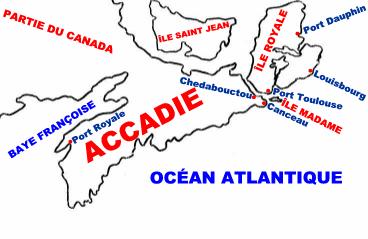
Les nommés Petitpas (Those named Petitpas) was how the French authority identified this Petitpas family in the 17th & 18th centuries.
Mostly this presentation contains and refers to copies of original documentation. It was put together to illustrate and hopefully clarify the inaccurate details of two biographies in the Dictionary of Canadian Biography/Dictionnaire biographique du Canada. These erroneous biographies are for Claude Petitpas II and his eldest son Barthélemy Petitpas. Claude Petitpas II's biography was published in the 1969 DCB/DBC volume II. Barthélemy Petitpas’ biography was published in the 1974 DCB/DBC volume III.
Also, these two biographies are available electronically at DCB/DBC Online:This presentation will also explain the effect that the 1713 Treaty of Utrecht had on Claude Petitpas II and his first four sons; while under English and French domination in the colonies.
Death of Barthélemy Petitpas
This research report story begins by the review of a copied original record which officially declares Barthélemy Petitpas dead. The year is 1750 and the hearing place is at Louisbourg in the then French colony named Île Royale (now – Cape Breton Island). The King George’s War from 1744 to 1748 was over. Louisbourg which had been captured during the war by the New England force was returned to France by the treaty of Aix-la-Chapelle.Library and Archives Canada (LAC) Website has 2 digital image copy pages of an original handwritten documentB1. Below the scope and content of this document dated October 9, 1750 says:
“Jean Jacques Brunet, négociant et demeurant en cette ville, George Barbudeau, chirurgien résidant au havre du Saint-Esprit en cette isle de présent en cette ville, et Pierre Brisson, habitant de l'Ardoise, lesquels ont affirmé par serment que Barthelemy Petitpas, interprète des sauvages en cette colonie est mort dans les cachots des prisons de Baston, en Nouvelle Angleterre, au mois de janvier de l'année 1747, au quel temps les trois étaient prisonniers dans la dite ville.”Above translated freely: Jean Jacques Brunet, negotiator and living in this town, George Barbudeau, surgeon and a resident of Havre St Esprit on this island and present in this town, and Pierre Brisson inhabitant of l'Ardoise, all affirm by oath that Barthelemy Petitpas, Interpreter for the Indians in this colony died in the dungeons of the prisons of Baston in New England, in the Month of January of the year 1747, at the time the three were prisoners in that town.
LAC Website has another digitized 3 pages copy of an original handwritten documentB2 dated April 12, 1749.
The scope and content states this:
“Gervais Brisset, oncle du côté maternel, a été choisi comme le subrogé tuteur de Jean, Pierre, Claude, Guillaume, Paul et Pelagie Petitpas, enfants issus de la communauté de Madelaine Coste, et de feu Barthelemy Petitpas, de son vivant, interprète des Sauvages de cette colonie.”Above translated freely: Gervais Brisset uncle on the maternal side, was chosen to be the subrogated tutor of Jean, Pierre, Claude, Guillaume, Paul and Pelagie Petitpas from the life of Magdelaine Coste and the deceased Barthelemy Petitpas during his life was Interpreter for the Indians in this colony.
It appears, the above record indicates that French Authority was aware, and considered or declared Barthélemy Petitpas dead as far back as April 12, 1749.
Furthermore, 2 digitized documents at LAC show French Authority had decease knowledge in 1747 about a pilot named Petitpas. Next are two records/letters between William Shirleyc1 Governor of Massachusetts and Charles de BeauharnoisA3.July 31, 1747 – Letter from William Shirley, governor of Massachusetts, to Charles de Beauharnois. It must be emphasized and noted the above mentioned “Shirley” is the same William Shirley along with the acting Governor Charles LawrenceA4 of Nova Scotia (Acadie) who planned and cooperated in the Exile of thousands of Acadian men, women and children by ships to other Colonies. This resulted in many of them dying a horrendous death. Also, this man is the same who had declared war against the Mi’kmaq and Maliseet (Malecite) people in 1744 with the British proclamation of scalpingP6.P1. This contextual information illustrates with which manners the governor could treat the Acadian and Mi’kmaq people and how this had a negative impact on the fate of Barthélémy Petitpas. Apparently, in this 3 page letter from Governor William Shirley of Massachusetts (less than 10 years prior to the mass Exile of the Acadians), he was trying to justify what he had done to France's Official Interpreter for the Indians - Barthélemy Petitpas. The following is an excerpt (see image 288v) of the 3 pages documentB3A at the Online LAC Website:P11.P8
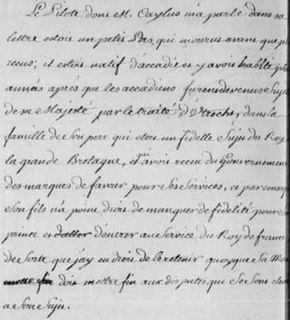 Excerpt translated freely: The Pilot that M. Caylus talked about in his letter was a petit Pas [Petitpas] who died before I received it. He was a native of Accadie who lived more years after the Accadians became subjects to his Majesty by the Treaty of Utrecht in the family of his father who was a faithful subject of the King of Great Britain and received from the government marks of favors for his services, and consequently his son has lack of faithfulness for the prince and entered the services for the King of France. So that I had the right to detain him, although his death must end the disputes about him.
Excerpt translated freely: The Pilot that M. Caylus talked about in his letter was a petit Pas [Petitpas] who died before I received it. He was a native of Accadie who lived more years after the Accadians became subjects to his Majesty by the Treaty of Utrecht in the family of his father who was a faithful subject of the King of Great Britain and received from the government marks of favors for his services, and consequently his son has lack of faithfulness for the prince and entered the services for the King of France. So that I had the right to detain him, although his death must end the disputes about him.The above document at LAC is a translation of Shirley's July 31, 1747 letter. LAC has a transcription of Shirley's letterB3B. Below are excerpts of the transcription folios (302v & 303) about the pilot named Petitpas:
Above transcribed freely: The pilot mention'd in Mr. Caylus's letter was one Petitpas who died before my receipt of it, and as to him he was a native of Accadie and an inhabitant there for several years after the Accadians became subjects to His Majesty by the treaty of Utrecht, in his father's family who was a faithfull subject of the crown of Great Britain, & had received marks of favour from this government for his services, & consequently his son had no right to throw off his allegiance and go into the french King's service, so that I had an undoubted right to detain him, however his death must end any disputes about him.
It must be emphasized that the English and the French were disagreeing and claiming about whose Subject Barthélemy was in correspondences between Beauharnois and Shirley in 1747. This is assuming that Barthélemy Petitpas was indeed the pilot named Petitpas. The July 31, 1747 transcribed letter from William Shirley, governor of Massachusetts, to Charles de Beauharnois is found on page 379 of the book titled Collection de Manuscrits Relatifs à la Nouvelle-France Vol. IIID1. Later on there is more notation about the (CMRNF Vol. III) documents that were references for Claude II (page 38 - 39, 379) and Barthélemy Petitpas' (page 379) biographies at DCB Online. The next excerpt of page 379 from the collection is regarding the pilot named Petitpas:P15.P3
Above transcribed freely: The pilot mention'd in Mr. Caylus's letter was one Petipas [Petitpas] who died before my receipt of it, and as to him he was a native of Accadie and an inhabitant there for several years after the Accadians became subjects to His Majesty by the treaty of Utrecht, in his farthr's family who (?) was a faithfull subject of the crown of Great Britain, and had received marks of favour from this government for his services, and consequently his son had no right to throw off his allegiance and go into the french King's service, so that I had an undoubted right to detain him, however his death must end any dispute about him.
Sept. 16, 1747 - Copy of the letter from Marquis de Beauharnois to William Shirley, governor of Massachusetts. The 3 digitized images of the original handwritten document B4 can be viewed at the LAC Website. Apparently, the next excerpt of this letter (Image 296v) is the acknowledgment from France of Barthélemy Petitpas' death:
Above translated freely: The death of the one named Petitpas ends all discussions between you and M. le Mgr de Caylus, I am sending back to you the letter of this General.
No records about Petitpas were found at the Online Massachusetts searchable, descriptive index Archives Website. However from the above documents it can be concluded that France acknowledged Barthélemy Petitpas' death.
Barthélemy Petitpas, William Shirley and The Treaty of Utrecht
The historians (from DCB Online) who wrote the Petitpas biographies for Claude II and his son Barthélemy did not mention the Treaty of Utrecht (March 31 – April 11, 1713).Ironically, as previously mentioned William Shirley apparently used the Treaty of Utrecht to justify the death of Barthélemy Petitpas who should have had rights according to the treaty as an Acadian and as an American Native Mi'Kmaq Indian. The specifics would be outlined in Article XIV and XV. It is very unlikely that William Shirley was not aware of this.
In his letter dated July 31, 1747, William Shirley corresponds that “Accadians became subjects to His Majesty by the treaty of Utrecht”. It had been a long time since Barthélemy and his father Claude II had emigrated to the French colony Île Royale (now – Cape Breton Island). How could William Shirley so unreasonably declare Barthélemy Petitpas a subject of Great Britain? The answer to this is most likely in the translation of the original Latin Treaty of Utrecht document to English and William Shirley himself.
The Early Canadiana Online (ECO) Website shows the following concerning the Treaty of Utrecht Article XIV:
"XIV. It is expressly provided, that in all the said places and colonies to be yielded and restored by the most Christian King, in pursuance of this treaty, the subjects of the said King may have liberty to remove themselves within a year to any other place, as they shall think fit, together with all their moveable effects. But those who are willing to remain there, and to be subject to the kingdom of Great Britain, are to enjoy the free exercise of their religion, according to the usage of the church of Rome, as far as the laws of Great Britain do allow the same."
This documentE1 can be seen at the ECO Website. After reading the above Article XIV someone could say this could imply that William Shirley's argument was that Barthélemy had not removed himself from Acadie (Nova Scotia) within one year so he became a subject of Great Britain.However, the ECO Website has the complete French translated version of the Treaty of Utrecht. The above highlighted word subject is not the proper word to use in translation because it could be misleading. Also if the word domination is translated in English as the word domination is used as in the French version, then the Article XIV takes a clear interpretation that the Acadians who chose to remain in Acadie (Nova Scotia) after one year would still remain as French subjects. There is nothing in Article XIV that says the Acadians who did not go elsewhere within the year would have renounced themselves as being subjects of France. Below for this research, Article XIV has been translated to English from the French version at the ECO Website. *2As of this writing the original Latin version Treaty of Utrecht has not been found for comparison and verification.
Article XIV translated freely:P3.P9 It is expressly agreed, that in all places and colonies that must be yielded or returned by the most Christian King, in accordance to this Treaty, the subjects of the said King will have the liberty to withdraw elsewhere within the time of one year with all their moveable things that they can transport where they so please; those nevertheless who would like to live and stay under the domination of Great Britain will enjoy the exercise of the Roman Catholic Religion as far as permitted by the laws of Great Britain.
As indicated, ECO Website has the documentE2 with Article XIV in French that was used to translate the above or see the below excerpt:
The French handwritten Article XIVF1 document copy is available at Archives Canada-France Website or see the below graphic excerpt:
Also, at Archives Canada-France Website there is: The EdictF2 from Queen Anne of Great Britain for the Acadians dated June 23, 1713, and the ProclamationF3 April 19, 1720 from Richard Phillips, Governor of Nova Scotia to the Acadians telling them to swear an oath of allegiance to the King of Great Britain or leave the province. Queen Anne of Great Britain in the Edict dated June 23, 1713 refers to the Acadians that would stay in Nova Scotia as their (Great Britain's) subjects.
As stated above the word subjects is not stated pertaining to Great Britain in Article XIV Treaty of Utrecht (See Article XIV translated freely, P3.P6). The Website 1755 The History and the Stories by the Centre D'Études Acadiennes of the Université de Moncton has a transcriptc2 of the (letter) Edict.This research found no amendment to Article XIV of the Treaty of Utrecht.
Subsequently to the above writing (see P3.P5*2) a Latin to English translation version of the Treaty of Utrecht Article XIV was found on the Internet.
The documentH8 can be viewed and downloaded from Memorial University's Digital Archives Initiative Website of Newfoundland. Below is an excerpt of page 74, Article XIV translation from Latin to English:After the above Latin Article XIV was reviewed it indicates that the word ſubeſſe = subesse (Note: The letters that look like the letter f in the word “ſubeſſe” are the old Roman “long “s” letters). Subesse means “to be under” in English. The word "under" translates as “sous” which is the word translated in the Latin to French version of the Treaty of Utrecht Article XIV. In the English Article XIV the Latin word subesse was translated as the wording “to be subject to” instead of the wording “to be under” (Note: “sub = under” & “esse = to be” which means “to be under” in English & “sub = sous” & “esse = être” which means “être sous (to be under)” in French). If the Latin word subesse would have been translated as the word “to be under”; this would have resulted in the Latin to the English translation as “But those who are willing to remain there, and to be under the kingdom of Great Britain” in the English Article XIV. Actually, the above Latin Article XIV verifies that the word subjects is not stated pertaining to Great Britain in Article XIV Treaty of Utrecht. The Latin word "subditi" which means subjects in English and sujets in French only appears once pertaining to (the most Christian King) the French King's subjects. The Latin word "Regno" translation to English is correctly "Kingdom".
What could be misleading is the use of the mistranslated word subject as describe is that it can be misinterpreted and taken out of context. In other words, the use of the mistranslated word subject in the English Article XIV can be misread giving the impression to someone in misinterpreting the phrase as: “But those who are willing to remain there, and to be
subject[s] to the Kingdom of Great Britain,”.Having a “s” at the end of the word subject would indicate that Acadians who did not go elsewhere within a year would have renounced themselves as being subjects of France and become subjects of Great Britain.
The previous statement is not such an extreme point or an unrealistic hypothetical scenario. In fact, several Websites were found to have written the word “subject” in its plural form as "subjects" in their partial or whole quotation versions of article XIV. Some of the Websites were very well intended Acadian & Cajun informative historical and genealogical forums. Furthermore it should be noted that in some (present-day) legal translations of the word “subesse” has evolved incorrectly to mean “subject to”.
One more bookD11 that Google digitized title is: "Latin Synonyms, With Their Different Significations: And Examples Taken From The Best Latin Authors". The author's name was Jean Baptiste Gardin Dumesnil. His book was published by G.B. Whittaker, at London in 1825. It confirms that in the English language the latin word "subesse" translation or meaning is "to be under". Below is an excerpt from the book:
Furthermore, Google's Translation WebsiteD12 for the Latin words "subditi" and "subesse" are in accordance to the above researched translations:
Prior to this update as pointed out above, and in conclusion after reviewing the available Latin Article XIV of the Treaty of Utrecht:
- Queen Anne (16650206 - 17140801) of Great Britain in the Edict dated June 23, 1713 refers to those who would stay in Acadie & Terreneuve (Nova Scotia & Newfoundland) as our (Great Britain's) subjects. There is nothing in Article XIV that says the Acadians who did not go elsewhere within a year would have renounced themselves as being subjects of France and become subjects of Great Britain. As well, Article XIV does not say that Acadians who did not go elsewhere within a year would have lost their possessions.P4.P1
- Also nothing was found in the Treaty of Utrecht of 1713 that said Acadians had to swear an oath of allegiance to her Majesty or Great Britain if they did not leave after one year. This is very puzzling & appears contradictory of the Proclamation of April 19, 1720 by Richard Phillips, Governor for Accadie (Nova Scotia) of his Majesty King George. In an excerpt of the Proclamation it states:
Above translated freely: that whatever the said François inhabitants have by their obstinacy or negligence drained the time, stipulated for them in the Treaty of Peace which was concluded at Utrecht to give the said oath or to withdraw from this country with their things
In addition for this research, many French documents dated after the signing of the Treaty of Utrecht were reviewed about "les nommés Petitpas". These documents were generated because of "les nommés Petitpas'" interaction with the French Authority. The French Authority referred to "les nommés Petitpas" at times, as Acadian, as French and as their Subject(s) (sometimes as “mauvais François” or “mauvais Sujet” meaning “bad Frenchman” or “bad Subject”) but never as Subjects of Great Britain. Neither did it matter where "les nommés Petitpas" lived. If M. St Ovide, the Governor of Île Royale thought that Claude Petitpas II (when living in Nova Scotia after the Treaty of Utrecht) was not living up to his expectations, M. St Ovide had no problem in sending French Authority to take "le nommé Petitpas". This applied to Claude II's young son which is explored at length later in this presentation. There are two records of this attempted captures which happened in late 1718 & 1719. It is look into further in below at P16.P2 & P16.P11. This happened after "le nommé Petitpas" had announced to French authority that he was in the Canceau area under English domination. The Louisbourg Institute of Cape Breton University - The Official Research Site for the Fortress of Louisbourg had a summaryG1 record of a letter dated November 30, 1717. LAC has a digitized copy of the original documentB5 relating to the Council's deliberation dated April 1, 1718 of the 15 page letter. It says when in English territory fishing such as Canceau Bay, the French Authority wrote that "le nommé Petitpas" said he was in the area under English domination. The statement is on page folio 18v - item and the next excerpt:
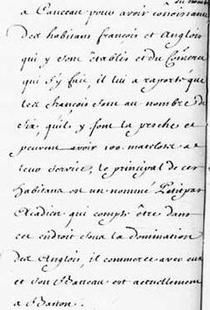 Excerpt translated freely: To be aware of the French and English inhabitants settled and the commerce that is taking place at Canceau. It was reported to him [Captain M. de la Ronde] that there are 6 Frenchman [françois] who do fishing and there could be 100 sailors working for them. The principal inhabitant is one named Petitpas, Acadian who says he is in this area under the domination of the English. He trades with them and his boat is now at Boston.
Excerpt translated freely: To be aware of the French and English inhabitants settled and the commerce that is taking place at Canceau. It was reported to him [Captain M. de la Ronde] that there are 6 Frenchman [françois] who do fishing and there could be 100 sailors working for them. The principal inhabitant is one named Petitpas, Acadian who says he is in this area under the domination of the English. He trades with them and his boat is now at Boston.This leads to the realization that France considered Acadians living in Acadie under English domination as France’s Subjects. Acadians remained as such according to the French translation of the Treaty of Utrecht (1713) as described previously. In other words, the French did not cede the Acadians to the English only the territory Acadie with the expectation of loyalty from Acadians. Of course the English did not see it that way. Finally, this led to the barbaric actions taken by Great Britain and its colonial force in 1755 and continued for many years. This was the mass Exile of the Acadians known as the French Neutrals from their homeland. The word deportation is not utilized in this presentation to describe the agony of the Acadians. They were not the aliens in Acadie thus the word exile is used.
Barthélemy Petitpas, William Shirley and The Treaty of Utrecht Continued
P3.P19Just because Queen Anne refers to the Acadians as (nos Sujets) our Subjects, didn't make Acadians in legal terms Great Britain's Subjects. She would have required an amendment to the Treaty of Utrecht which would have involved having an agreement with the King of France.It is not thought that Queen Anne wrote something (herself) knowingly to mislead. However, some of the seeds were planted with her Edict to give an appearance that Acadians were Great Britain's Subjects if they did not leave within a year which was not indicated in the Treaty of Utrecht. Of course what helped this appearance was that in the English Article XIV, the Latin word subesse was translated as the wording “to be subject to” instead of the wording “to be under”.
Quite a number of the Acadians were very savvy or educated people and most would know the Latin and English languages. Therefore, Article XIV of the Treaty of Utrecht would be very clear to them that they were not British Subjects after a year. That is why they stayed in Acadie (Nova Scotia) and did not relocate to the other French colonies, Île Royale and Canada. Also, the Acadians knew by giving an unconditional oath it would make them British Subjects.
The Acadians were not British Subjects; this point is supported in a legal manner by Article XIV of the Treaty of Utrecht. In addition, this is supported by the actions of the French, the Aboriginals and the English during about the time period of 1713 -1755. Also, of course the actions of the Acadians themselves.
The Acadians and the French were reading and applying the Treaty of Utrecht as they saw it from a Latin to French translation. Of course, the English and its colonial force were reading and applying the Treaty of Utrecht as they saw it from Latin to English translation. One can just picture in their minds the colonial English and French Governors arguing over disputed territories (no it says that... – your wrong it says that...).
As said before, the word subject must not be written in its plural form (as subjects in regards to the phrase "and to be subject to the kingdom of Great Britain") because it vastly changes the context of Article XIV. This may have originally started as a old writing error and/or in more recent times as a typing error. However, a surprising fact was uncovered by a Google Web search. The search phrase with the search operator quotations marks was: "to be subjects to the kingdom of Great Britain". Quite a few results from Websites were found that had that incorrect phrase. Of course the "s" at the end of the word subjects found in the Google search results about Article XIV of the Treaty of Utrecht were errors. One bookD7 that Google digitized was published in 1878 and its title is: "Statutes, Documents and Papers Bearing on the Discussion Respecting the Northern and Western Boundaries of the Province of Ontario, Including the Principal Evidence Supposed to be Either for Or Against the Claims of the Province". An interesting fact is that the book digitized by Google was published over 135 years ago, and originally from Harvard University and part of the Harvard Law Library. Next is an excerpt of page 17 from the book:
There were several other digitized Google eBooks and documents found that have a different error that vastly changes the context of Article XIV. In their cases it was not by adding a letter “s” to the end of the word subject but by the omitted last three letters from the word Kingdom. There are three documents with that error listed in this presentation's "Source D" as Der1, Der2 and Der3.
To continue, it may well be that the English unintentionally viewed, were seeing or saw (imagined) a “s” on the end of the word subject. That would be for the involvements of Queen Anne (16650206 - 17140801) of Great Britain, Governor Charles Lawrence and William Shirley etc.. That said they thought that the Acadians who did not leave within a year automatically became British Subjects. It very well could be that the English were aware that the Treaty of Utrecht wording or its articles did not make the Acadians British Subjects after one year. Could it be that is why the English were so adamant in trying to get the Acadians to swear an oath of allegiance to them? Why ask for a unconditional oath if they were British Subjects after a year in 1714? It was immoral for the English to insist that the Acadians had to sign an oath that would compel them to bear arms against the French and the Aboriginals.
The 1763 Treaty of ParisH13 article 4 is quite clear in the wording in referring to the the inhabitants of Canada (Canadiens/Canadiennes) as being "new Roman Catholic Subjects" of his Majesty of Great Britain. In addition article 4, clearly states "that the French inhabitants, or others who had been subjects of the Most Christian King in Canada".
Furthermore, lets not forget the Proclamation of April 19, 1720 by Richard Phillips, Governor for Acadie (Nova Scotia) when he tried to make the Acadians believe that it was stipulated in the Treaty of Utrecht as follows:
Translated freely: “that whatever the said François inhabitants have by their obstinacy or negligence drained the time, stipulated for them in the Treaty of Peace which was concluded at Utrecht to give the said oath or to withdraw from this country with their things”Acadians knew that they were French Subjects living in a territory ceded to Great Britain according to the Treaty of Utrecht.
Acadians were distinct people who had no say in their domination at a particular time. The first Acadians and their descendants had live for over 150 years in union and amicably with the Aboriginals.
Just because the Acadians were coerced or forced on to vessels to be exiled to British colonies or England, and apparently the French doing very little to stop the exile doesn't make the Acadians less of as being French Subjects according to the Treaty of Utrecht.
Warren A. PerrinH14 in his PetitionH15 (that resulted in the Royal Proclamation of 2003H16 which designated July 28th of every year as a commemoration of the “Grand Dérangement” and it began on July 28th 2005) stated this:
- “Assumptions
The Acadians were held to be British subjects (50) by the memorandum of Judge Jonathan Belcher” - “Genocide [...]
4. Violation of customary international law regarding treatment of prisoners of war: If we assume that the Acadians were French-subjects, the British violated the then existing customary international law regarding the treatment of prisoners of war. (103)”
A transcriptionH17 of Judge Jonathan Belcher's memorandum dated July 28, 1755 (in English and French) can be viewed at the Free Library by Parlex Website. Below are two excerpts from the Website of his ruling:
- “By their conduct from the Treat of Utrecht to this day they have appeared in no other light than that of Rebels to His Majesty, whose Subjects they became by virtue of the Cession of the Province and the Inhabitants of it under that Treaty.”
- “As to their conduct since the Treaty of Utrecht in 1713 - Tho it was stipulated that they should remain on their lands on Condition of their taking the Oaths, within a year from the date of the Treaty”
Belcher made a grave error of law by wrongly using a legal agreement between Nations. That is, the Treaty of Utrecht to support his claim that Acadians were British Subjects.
Belcher would have known that the Edict by Queen Anne was not a legal binding document or a law. Therefore, he did not refer to her Edict in his ruling. He resorted to wrongfully paraphrasing the contents of Article XIV of the Treaty of Utrecht to give the appearance that the Acadians were British Subjects by it.
The misdeeds that Judge Belcher ruled factually that what the Acadians had done had little to do with the Acadians and are unfounded.
Furthermore, it was not the Acadians fault that Great Britain made a bad agreement with France by the Treaty of Utrecht of 1713 regarding their interest in the ceded territory.
That is, in English dissatisfaction in how the French missionaries, the Aboriginals and French were able to conduct themselves under the treaty agreements. Also, of course, the Acadians able to remain in Acadie (Nova Scotia) legally as French Subjects according to what was the written law in the Treaty of Utrecht of 1713.
In the wording or articles of the Treaty of Utrecht of 1713, no wording was found that supported that Acadians became British Subjects because the province was ceded, and/or stipulation that Acadians had to take an oath within a year from the date of the Treaty.
According to the wording in article XIV – Acadians remained French Subjects and would only lose their belongings legally if they had chosen freely to leave Acadie after one year in 1714.Therefore, needless to say, we know Acadians did not leave Acadie of their own free will.
The Royal Proclamation of 2003 is a start in the right direction. One thing right is in it not referring to the Acadians people as British Subjects. However, it does little to stop the dodging since 1755, in the question of law that the exile of the Acadians was unlawful. It is very unlikely that Great Britain would ever admit that the exile of the Acadians was unlawful.
Therefore, that would have to objectively take place or heard and decided in a setting like an International Tribunal. Lets remember, that it is declared here that Judge Jonathan Belcher used an international treaty wrongly in a unlawful manner to exile the Acadians in 1755.
Anyway, there is more in the next point 5 of this presentation, that is, on Judge Jonathan Belcher's mandate regarding the Acadians that was outlined in the letter dated October 29, 1754 from the Lords of Trade to Lieutenant Governor Lawrence.
The wrongs of history needs to be acknowledged clearly, otherwise those wrongs towards people will go without consequence, accountability and penalty, which will give room for new wrongs by others to be tolerated and repeated.
There are many opinions regarding the fate of the Acadians and what really happened back then. The world must be made aware correctly of history, which will ensure the remembrance of the terrible wrongs done to the Acadian people. Historians and people need to make sure if they indulge in the act of paraphrasing to make sure their information is from reliable source, and in their research to practice the motto or saying “trust but verify”.
- “Assumptions
Barthélemy Petitpas, William Shirley and The Treaty of Utrecht Continued
Another digitized bookD8 by Google is very revealing, it was published in 1869 and titled:
“Selections from the Public Documents of the Province of Nova Scotia: Published Under a Resolution of the House of Assembly Passed March 15, 1865”. On pages 264 and 265 of the book in the notes, the author Thomas Beamish Akins explains why he thinks the Acadians became British Subjects. He stated this:
“No mention is made, either in the Treaty or the Queen's letter, of a qualified allegiance. It is therefore clearly obvious that those who chose to remain, thereby became subjects of Great Britain, and were bound to take the Oath of allegiance to the Sovereign, when lawfully required.”What the author appears to have forgotten or missed is that according to the wording of the legal document the Treaty of Utrecht and its Article XIV, the Acadians were still legally French Subjects and didn't have to give any Oath of allegiance at all because the treaty did not stipulate it. The law was the Treaty. Actually, the Acadians made a non required concession according to the Treaty in giving a conditional oath. They were prepared to leave on several occasions when coerced to swear an unconditional oath. Acadians were prevented in leaving by Great Britain's authority. This was because Great Britain was scared if the Acadians left Nova Scotia (Acadie) they would reinforce and strengthen France's colonies of Canada and Île-Royale. The author's own selected documents for his book shows this. One of the times that the Acadians asked to leave Nova Scotia (Acadie) is recorded in a letter (page 173, book D8) dated September 6, 1749. The deputies from the French (Acadian) districts presented it at a council meeting.
Next is an excerpt of the letter:
“The inhabitants in general, Sir, over the whole extent of this country, have resolved not to take the oath which Your Excellency requires of us; but if Your Excellency will grant us our old oath which was given at Mines to Mr. Richard Philips, with an exemption for ourselves and for our heirs from taking up arms, we will accept it.
But if Your Excellency is not disposed to grant us what we take the liberty of asking, we are resolved, every one of us, to leave the country.”What follows is a excerpt from page 174 of Governor Edward Cornwallis answer to the Acadians:
“But you ought to know, that, from the end of the year stipulated in the treaty of Utrecht for the evacuation of the country, those who chose to remain in the province became at once the subjects of the King of Great Britain.
The treaty declares them such— The King of France declares, in the treaty, that all the French who shall remain in these provinces, shall be the subjects of His Majesty.”Of course, the treaty of Utrecht doesn't stipulate what Cornwallis communicated to the Acadians. He appears to have been clueless of the wording of the treaty or was he knowingly trying to make the Acadians agree to accept something which is obviously false. As said before, Acadians knew what was stipulated in the treaty. A lot of them would be capable in the Latin language, and if needed, they had available complementary consultation in having the expertise of their priests. Indeed they could verify in Latin that their French translation and interpretation of the treaty of Utrecht was correct.
However, in 1750, Cornwallis' policy resulted in many Acadians deciding that they wanted to leave and go to Île Saint-Jean. But they were being detained. They were told to sow their fields which they did and after they were refused because no passports were being issued. This is according to an answer to the Acadians by Governor Edward Cornwallis during a Council held with the Governor on March 25, 1750 (see pages 189 to 192 of book D8).
This leads to another excerpt of page 267 which is another note in the book (D8) by the author:
“The term "Neutral French" having been so frequently applied to the Acadians in public documents—their constant denial of an unqualified oath ever having been taken by them, and the reiterated assertions of their priests that they understood the oaths taken from time to time, in a qualified sense, (by drawing a distinction between an Oath of fidelity and one of allegiance,) led the Governors at Halifax, in 1749, and at subsequent periods, erroneously to suppose that no unconditional Oath of Allegiance had ever been taken by the people of Acadia to the British Crown.”What the author had failed to take into account is that the Governors didn't error. The reason is that King George II and the Lords of Trade knew there was a legality issue with the oaths. That is the oath's verbal part or the clause that Governor Phillips promised to the Acadians – to not have to bear arms. Governor Phillips was a representative of the King of Great Britain and could not mislead the Acadians or his King in his wish in having the Acadians freely and in a truthful manner become his Subjects. Also, there was a problem with the written part of the oath he gave. In a letter dated May 20, 1730 from Mr. Secretary Popple at Whitehall to Governor Phillips, Popple brought this to governor Phillips attention, the following is an excerpt (see book D8 pages 84 and 85) of the letter:
“Sir — You will perceive by the first paragraph of the letter from My Lords Commissioners for Trade and Plantations to you of this days date that their Lordships wish the Oath which the French Inhabitants at Annapolis have voluntarily taken had been in more explicit Terms, and therefore I am to observe to you that by the words of that Oath, the French do not promise to be faithful to His Majesty.”In a letter (see pages 87 to 88 in book D8) dated November 26, 1730 Governor Phillips wrote to the Lords of trade. Next is excerpt of that letter:
“I am sorry to find Your Lordships think the Oath which the Inhabitants of this River have taken not to be well worded, I used my best understanding in the forming of it and thought I had made it stronger then the original English, by adding the words, "en foi de Chrétien" and "que je reconnois" &c., the word fidèle is the only one I could find in the dictionary to express allegiance and am told by French men that both it and obéir govern a dative case, and the conjunction, et, between makes both of them to refer to the Person of the King, according as I have learned grammar, and I humbly conceive that the jesuits would as easily explain away the strongest oaths that could be possibly framed as not binding on papists to what they call a Heretic. Your Lordships will observe the oath that has been afterwards given to the body of the Inhabitants up the Bay of Fundy, to be varied; it was upon occasion of their thinking the other too strong. I believe Your Lordships will think this not liable to the same objection as the other, and not at all weakened in the alteration.”Furthermore, nothing could be more clearer on the Lords of Trade position about the Treaty of Utrecht and an unconditional oath regarding the Acadians. In a letter dated October 29, 1754, the Lords of Trade at Whitehall wrote to Lieutenant Governor Lawrence. An excerpt (see book D8 pages 236 & 237) of the letter states this:
Above transcribed freely: It is certain that by the Treaty of Utrecht their becoming subjects to Great Britain (which We Apprehend they cannot be but by taking the Oaths required of Subjects) is made an express Condition of their continuance, after the Expiration of a Year, and therefore it may be a question well worth considering, how far they can be treated as Subjects without taking such Oaths, and whether their refusal to take them, will not operate to invalidate the Titles to their Lands; it is a question, however, which We will not take upon ourselves absolutely to determine, but could wish that you would consult the Chief Justice upon this Point, and take his Opinion, which may serve as a foundation for any future measure it may be thought advisable to pursue with regard to the Inhabitants in general. As to those of the District of Chignecto, who are actually gone over to the French at Beau Sejour, if the Chief Justice should be of opinion that by refusing to take the Oaths without a reserve, or by deserting their Settlements to join the French, they have forfeited their Title to their Lands, We could wish that proper Measures were pursued for carrying such Forfeiture into Execution by legal Process, to the end that you might be enabled to grant them to any persons desirous of settling there,
The Chief Justice Jonathan Belcher did not follow the mandate issued by the Lords of Trade. To be perfectly clear and well worth repeating.
The first part of Belcher's mandate was: “how far they [les Acadiens] can be treated as Subjects without taking such Oaths, and whether their refusal to take them, will not operate to invalidate the Titles to their Lands”.
The second part of Belcher's mandate was to decided about the Acadians from the District of Chignecto who had deserted their Settlements: “If the Chief Justice should be of opinion that by refusing to take the Oaths without a reserve, or by deserting their Settlements to join the French, they have forfeited their Title to their Lands”.Obviously, the Chief Justice of Nova Scotia Jonathan Belcher's did the opposite to what the Lords of Trade had declared. Belcher ruled that the Acadians were British Subjects according to his wrongful interpretation of the Treaty of Utrecht as previously described. In other words, Belcher's mandate from the Lords of Trade was simply to determine in accordance to the Treaty of Utrecht could the Acadians still own land if they were not British Subjects (treated as Subjects does not mean legally being Subjects).
Of course the Acadians could still own land according to what was stipulated in the Treaty. As said before there was nothing in the Treaty of Utrecht that compelled the Acadians to swear oaths to Great Britain, and or lose their possessions if they remained in Nova Scotia (Acadie). The Treaty had no stipulated time limit on that matter.
This brings us back in this presentation with the facts presented here that the exiled Acadians were legally not British Subjects according to the Treaty of Utrecht. Thus, they should have been treated as prisoners of war. Next is an excerpt of page 278 which is another note in the book (D8) by the author:
Above transcribed freely: * The French Acadians who were sent to Pennsylvania, petitioned the Governor and Council of that Province, in Sept. I756, to be treated as prisoners of War, and to be permitted to join their own nation, and from the tenor of their petition it would appear they did not wish to become settlers in that Province. The Governor and Council, however, on reference to Governor Lawrence letters, declined to treat them as prisoners of War and subjects of the French King, but as subjects of the King of Great Britain, and recommended the House of Assembly to "provide for them in such a manner as they should see fit."— Colonial Records, Pcnn., vol. 7. p. 241. They appear to have received better treatment at the hands of the Government of Philadelphia than was accorded to them in some of the other Provinces.
The author's reference to the Pennsylvania petition dated September 2, 1756 is available on pages 239 to 241 from a digitized bookD9 by Google titled: Minutes of the Provincial Council of Pennsylvania: From the Organization to the Termination of the Proprietary Government. [Mar. 10, 1683-Sept. 27, 1775], Volume 7.
The Acadian men who are listed on the Pennsylvania, petition of September 2, 1756 may have been involved with another petition (see source H15*1). It was in 1760 to the King of Great Britain for a legal hearing. Another digitized bookD10 by Google titled: An Historical and Statistical Account of Nova-Scotia, Volume 1. The author Judge Thomas Chandler Haliburton refers to the petition in pages 183 to 195 and expressed his very poignant comments of the event at page 196.
Someone may ask what does this point or chapter of this presentation have to do with Bathélemy Petitpas? To have their way with him from 1745 to 1747, Great Britain and its colonial force by Governor William Shirley illegally declared Bathélemy Petitpas a British Subject by the Treaty of Utrecht. This allowed Britain to avoid giving him the protection and treatment required to a prisoner of war by International law.
About 10 years later, Great Britain and its colonial force by Judge Jonathan Belcher's ruling illegally avoided International Law in the same way again when he wrongfully declared that all the Acadian children, women and men by the Treaty of Utrecht were British Subjects instead of being French Subjects and prisoners of war.
William Shirley and Barthélemy Petitpas Continued
William Shirley had declared war against the Amalécite [Malecite] and Mi’Kmaq Nations in 1744. He offered a payment out of the Public Treasury for producing the scalp(s) to prove their deaths. The Online Massachusetts searchable descriptive index Archives has a documentH1. The summary of the document reveals:P2.P8 “PROCLAMATION BY GOV. WILLIAM SHIRLEY CALLING FOR VOLUNTEERS TO FIGHT AGAINST THE ST. JOHNS AND CAPE SABLE INDIANS. GOVERNOR SHIRLEY ENCOURAGED SCALPING AND INCLUDED THE SET BOUNTIES FOR SCALPS AND OTHER PLUNDER.” William Shirley should have been aware that Barthélemy Petitpas was Mi'Kmaq, and did he mistake Barthélemy for someone else? Wasn't Barthélemy the same person who received 3 years of schooling at Harvard in Boston at the expense of Great Britain? The apparent education was due to the humanitarian efforts of his father Claude II who negotiated the release of English prisoners in the late Indian war. He paid for the release with his own money. This is according to interpretation of an English (reference 59) record by Emma Lewis Coleman in 1925. Her bookH2 was used as a reference (see P11.P1) for Claude II and Barthélemy Petitpas' biographies.The reality was that William Shirley thought Great Britain owned Barthélemy Petitpas. Barthélemy Petitpas did not dodge his duties. Furthermore, it is difficult to think that William Shirley would not be aware and mention that Barthélemy Petitpas’ French employment and title was that as Interpreter for the Indians. He was employed in this capacity since 1733 after his father’s death. Claude Petitpas II held the position prior to Barthélemy Petitpas' appointment. William Shirley from a military point should have known that Claude Petitpas II also like his son Barthélemy had emigrated elsewhere to Île Royale (Cape Breton Island).
It must be noted that the English wanted to end France’s friendship they had with the Mi'Kmaq Nation. William Shirley, being at war with France, would undoubtedly know that he could advance his position if the French were to lose their Interpreter for the Indians. This would have resulted in France losing Amalécite (Malecite) and Mi’Kmaq communication and the ability to conduct diplomatic negotiations. Therefore, this would have been an effective military and political strategy.
The LAC Website has 11 digitized images of the original handwritten documentB6. This is an invoice for services rendered by Major Officers and other necessities for the colony during the year 1745. This document was dated August 27, 1746 . The details of payment regarding Barthélemy Petitpas as Interpreter for the Indians is on page 5 of 11 (Second expense from the bottom of the page). Below is an excerpt about his employment:
Above translated freely: To Barthelemy Petitpas, Interpreter for the Indians, the Employment amount of 600#
The How and When of The Petitpas' as Interpreter for The Indians
One of the records at LAC Website, is a handwritten documentB7 (see folio 5 & 5v) resumé of a letter dated November 16, 1732. It is the application and recommendation for approval of Barthélemy Petitpas as Interpreter for the Indians to replace his father Claude II who died. This letter confirms that Claude Petitpas II died in 1732, at DCB Online his biography states “He died probably some time between 1731 and 1733”. Also, the letter says that Barthélemy Petitpas has a perfect command of the Mi’Kmaq and the Amalécite [Malecite] languages, and has all the qualities necessary to be a good interpreter.Note: It is not mentioned at DCB Online in Barthélemy's biography that he could speak the Indian language Amalécite [Malecite]. Also, Author Isabelle Ringuet brings this to her readers' attention in her thesisB8 at the bottom paragraph on page 73B8c (also, see below P12.P1). Below at (P17.P25) by translated excerpts this letter dated November 16, 1732 is explored further.
Another LAC Website recordB9 (scope & content) dated May 19, 1733 is the approval of Barthélemy Petitpas as Interpreter for the Indians.
Father Maillard's Account of Barthélemy Petitpas' Death
Pierre Antoine Simon MaillardA5 whose biography is at DCB Online, in an account wrote this: “About the same time one named Bartholomew Petitpas, an appointed savage-linguist, was carried away prisoner to Boston. The savages have several times demanded him in exchange for English prisoners they then had in their hands, of whom two were officers, to whom they gave their liberty, on condition of the Bostoners returning of Petitpas; whom, however, they not only kept prisoner, but afterwards put to death.”This research discovered no Governmental documentary evidence record that the Bostoners executed Barthélemy Petitpas. However, Father Maillard says in his manuscript that Barthélemy Petitpas was carried away prisoner to Boston about July 1745. The records indicate that he died in January 1747. During that time Barthélemy would be in his late fifties, and he would have spent approximately 18 months in the Boston dungeons before he died or was put to death. In any event, Barthélemy incarceration in the Boston dungeons could be viewed as a sort of death sentence in itself. That is how could a man of his age survive for numerous years in the Boston dungeons. Also, this leads one to think that the people keeping him in captivity would be quite aware of Barthélemy's thin chance of survival in the dungeons at his advanced age.
The above reference to the manuscript by Pierre Antoine Simon Maillard was translated from French to English. In the book, there are 4 pieces of writing which the first two are attributed to Father Maillard. The piece of writing that refers to Barthelemy Petitpas is titled Memorial of the Motives of the Savages, called Mickmakis and Maricheets, for continuing the war with England since the last peace. Dated Isle-Royal, 175-.. The book is titled: An Account of the Customs and Manners of the Micmakis and Maricheets Savage Nations, Now Dependent on the Government of Cape-Breton. This documentH3 is available on the Internet from Project Gutenberg Website. The original 1758 published book is now in the public domain and available from Google. The reference to Barthelemy Petitpas is on pages 64 and 65 of the original bookD2.
In his book published in 1870 for the French Complaints at page 43, Samuel Gardner Drake makes a reference about Barthelemy Petitpas that they "finally put him to death". There is more about his book below at point 11. In his book at page 44, he states: "These accusations or charges are the substance of speeches delivered to the eastern Indians by the Count de Raymond, to inflame them to prosecute the war".
Obviously, the accusations or charges written were a translation from French to English. Fortunately, for the sake of authenticity of the French accusations and the accuracy of translation, there are two books of French origin which have the content of the accusations. However the authors of the books differ in who is the author of the piece of writing.
The first bookD3A was written in French by Thomas PichonA6 published in 1760 and titled: Lettres et mémoires pour servir à l'histoire naturelle, civile et politique du Cap Breton. The letter (page 129, LETTRE X.) is titled Suite des moeurs des sauvages, discours qui leur fut fait par le Comte de Raymond pour les empêcher de faire leur paix avec les Anglois.
Next are the first book's excerpts of pages 129 (letter title), 133 and 134:
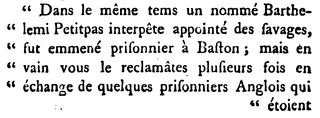
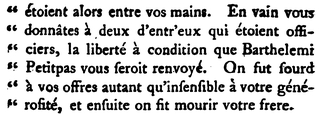 Excerpt translated freely
Excerpt translated freely
LETTER X.
Further to the customs of the Savages, the speech which was made for them by Comte de Raymond to prevent them from making their peace with the English.
At the same time, one named Barthelemi Petitpas, appointed interpreter for the Savages was taken prisoner to Boston, but in vain you asked for him several times in exchange for some English prisoners who were in your hands. In vain you gave two of which were officers among them freedom provided that Barthelemi Petitpas would be returned to you. They were deaf to your offers as insensible to your generosity, and afterwards they killed your brother.The 1760 French book written by Thomas Pichon was translated and published in English. The following from the 1760 English bookD3B is an excerpt from page 163 regarding Barthélemy Petitpas:
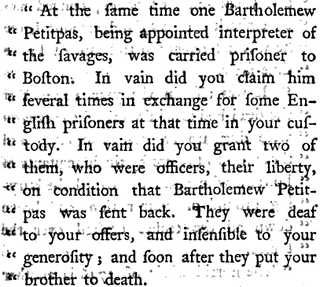 Excerpt transcribed freely
Excerpt transcribed freely
At the same time one Bartholemew Petitpas, being appointed interpreter of the savages, was carried prisoner to Boston. In vain did you claim him several times in exchange for some English prisoners at that time in your custody. In vain did you grant two of them, who were officers, their liberty, on condition that Bartholemew Petitpas was sent back. They were deaf to your offers, and insensible to your generosity; and soon after they put your brother to death.The second bookD4 was written in French by Father Henri Raymond CasgrainA7 which was published in 1897 and titled: Les sulpiciens et les prêtres des Missions-étrangères en Acadie. The letter (page 437, memoir) is titled MOTIFS DES SAUVAGES MIKMAQUES ET MARICHITES DE CONTINUER LA GUERRE CONTRE LES ANGLAIS DEPUIS LA DERNÈRE PAIX.
Next are 3 excerpts from the second book. The first excerpt has Father Casgrain's explanation of the evidence uncovered and his reasons why the memoir is attributed to Father Maillard. Also, the first excerpt from page 437 contains the memoir's title. The second excerpt, a footnote is still from page 437. The third excerpt from page 439 is the information from the memoir about Barthélemy Petitpas:
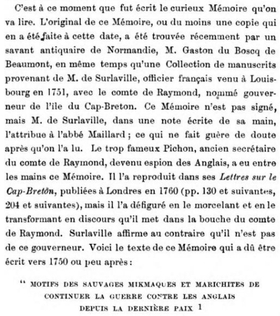 Excerpt translated freely: It is at this time that was written the curious memoir that we will read.
The original memoir, or at least a copy that was made at that time, was found recently by a antiquary scholar of Normandy, M. Gaston Bosoq of Beaumont. This was at the same time, along with a collection of manuscripts from M. Surlaville, a French oflicier who came to Louisbourg in 1751, with the Comte de Raymond, the appointed governor of the island of Cape Breton. This Memoir is not signed, but M. de Surlaville in his hand written note, attributed it to Maillard, which there was little doubt after we read it. The too famous Pichon, former secretary of Comte de Raymond, who became a spy for the English, had this memoir in his possession. He reproduced it in his Letters about Cape Breton, published in London in 1760 (pp. 130 and following, 204 and following). But he disfigured it by fragmenting and turning it into speech and puts into the mouth of Comte de Raymond. Surlaville affirms the contrary, it is not the governor.
Here is the text of this Memoir that must have been written in 1750 or soon after:
Excerpt translated freely: It is at this time that was written the curious memoir that we will read.
The original memoir, or at least a copy that was made at that time, was found recently by a antiquary scholar of Normandy, M. Gaston Bosoq of Beaumont. This was at the same time, along with a collection of manuscripts from M. Surlaville, a French oflicier who came to Louisbourg in 1751, with the Comte de Raymond, the appointed governor of the island of Cape Breton. This Memoir is not signed, but M. de Surlaville in his hand written note, attributed it to Maillard, which there was little doubt after we read it. The too famous Pichon, former secretary of Comte de Raymond, who became a spy for the English, had this memoir in his possession. He reproduced it in his Letters about Cape Breton, published in London in 1760 (pp. 130 and following, 204 and following). But he disfigured it by fragmenting and turning it into speech and puts into the mouth of Comte de Raymond. Surlaville affirms the contrary, it is not the governor.
Here is the text of this Memoir that must have been written in 1750 or soon after:
" MOTIVES OF THE MIKMAQUES AND MARICHITES SAVAGES FOR
CONTINUING THE WAR AGAINST THE ENGLISH
SINCE THE LAST WAR 1
Above transcribed freely: 1- " This memoir is certainly not from Raymond: I believe it is from abbot Maillard".-Note from M. de Surlaville, the major of the troupes at l'Île Royale.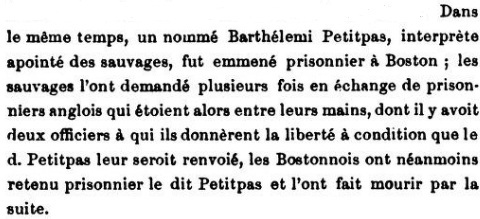
Above transcribed freely: At the same time, one named Barthélemi Petitpas, appointed interpreter for the Savages was taken prisoner to Boston, the Savages had asked for him several times in exchange for some English prisoners who were in their hands, which two were officers that they gave them freedom provided that the said Petitpas would be returned. However, the bostoners kept the said Petitpas and afterwards killed him.In short, Father Casgrain thought that the memoir shouldn't be attributed to a speech given to the Indians by the Comte de RaymondA8 the Governor of Île Royale. However, it is the opinion from this research there is a very uncomplicated explanation, Comte de Raymond was fairly new in the Colony. Thus he listened and utilized the information that Father Maillard and other persons provided for his motivational speeches to the Indians.
Thomas Pichon wrote that he was only the editor of the letters in his book. They were written at Louisbourg commencing from 1752 to the siege of that place. He titled them which the letter X is importance to this research on Barthélemy Petitpas. The writer of letter X, had promised an example of a speech for his reader that was given to the Indians. The speech was included as part of the letter. No editorial notes were found in the letters.
This is a sharp contrast to how the above reference book titled An Account of the Customs and Manners of the Micmakis and Maricheets Savage Nations, Now Dependent on the Government of Cape-Breton (H3 & D2) depicts the French complaints. This book has many editorial comments (in square brackets) within the four pieces of writing. In most cases these comments try and explain away the recounting of the awful events and accusations against the English. This is done by putting the blame elsewhere in a sarcastic manner. The book depicts the Indians as uncivilized, barbaric and dismisses disrespectfully their customs. The book's first piece of writing as said before is attributed to Father Maillard. However there is suspicion from this research that the letter is not from him. Its first four paragraphs appear to contain summary of the start of a lengthy letter, that Father Maillard wrote on the subject of the Indian ways of those parts of the country. He had written it for his superior M. de Lalane in Paris. This letter is discussed further below at point P19.P3.
As stated previously, this research discovered no Governmental documentary evidence record that the Bostoners executed Barthélemy Petitpas. However, the note from M. de SurlavilleA9 the major of the troupes at l'Île Royale attributed the memoir to Father Maillard. Plus the fact that a copy of the memoir was in M. de Surlaville possession puts credence that Barthélemy Petitpas was put to death.
Barthélemy Petitpas' Biography and The Year 1722
Eric KrauseP18.P4 (krause House Info-Research Solutions) - The Build History of Port Toulouse, Isle Royale, for The Louisbourg Institute of Cape Breton University, had a summary record about Barthélemy Petitpas. This summaryG2 was on the Official Research Site for the Fortress of Louisbourg Website ("1721 - November 05"). It states that Barthélemy lost his civil court case relating to the confiscation of his schooner and cargo. His sentence was upheld on appeal in 1722: “Later, in 1722, the Council confirmed the sentence, and he was ordered to pay 1000 pounds [livres] plus court expenses.”
From the record, it appears that Barthélemy Petitpas:- was a resident of Port Toulouse and at that time was living under French domination.
- was working in some capacity as interpreter for the Indians for the French.
- was conducting himself in a civil manner, within one day, he appealed his sentence of November 4, 1721.
Therefore, it would be most unlikely that the French had to capture him. In his biography on the DCB Online Website, paragraph 4, it is outlined that he was captured. He may have been arrested but doesn't the word capture seem very bold and a term saved for an enemy?
However in 1925, Emma Lewis Coleman in her book wrote: "but M. de Saint-Ovide61 found a way to get the young man out of the hands of the English and entice him to Quebec". This was regarding Barthélemy Petitpas for the year 1722. Later in this document, there is more about her book in more detail and the fact that the young man's first name was not mentioned in her reference. This is according to copies of original documentation reviewed during this research.
Also, the first name of the young Petitpas was not mentioned in the following two references from Barthélemy's biography at DCB Online are AN, Col., B, 45F4, ff200F4f, 205; and C7, 244B10*3. These records are at Archives Canada-France & Library and Archives Canada Websites. As previously written, the young man is not referred to by first name, just as Petitpas and Le Nommé Petitpas son of an inhabitant from Acadie. The first above reference (ff200 - Item 201) is dated 1722:
![Hyperlinked excerpt from an Online document from the Canada-France Archives at LAC about the son of le nommé [the one named] Petitpas](img-r/17221215.jpg) Excerpt translated freely: To M. de Beauharnois - At Versailles Dec. 15, 1722 - Mister the Council made M. de Regens aware of your notification you gave about the arrival at Rochefort of the son of the Nommé Petitpas. A French inhabitant of Acadie who boarded on the flutte le chameau [name of a ship]. The reason which was determined by Vaudreüil and Begon to send this young man at the King's expense. S.A.A. has judged for the same reason that it is just to have him learn piloting, and to have him serve when he his capable.
You will conform to the comments of S.A.R.. You need to be aware of his conduct and pay attention that he doesn't escape to board English vessels.
Excerpt translated freely: To M. de Beauharnois - At Versailles Dec. 15, 1722 - Mister the Council made M. de Regens aware of your notification you gave about the arrival at Rochefort of the son of the Nommé Petitpas. A French inhabitant of Acadie who boarded on the flutte le chameau [name of a ship]. The reason which was determined by Vaudreüil and Begon to send this young man at the King's expense. S.A.A. has judged for the same reason that it is just to have him learn piloting, and to have him serve when he his capable.
You will conform to the comments of S.A.R.. You need to be aware of his conduct and pay attention that he doesn't escape to board English vessels.The scope and content for the second above mentioned reference (C7, 244*3) indicates: Petitpas - Son of a inhabitant of Acadie - 1727, his transfer from Boston to Québec, then to Martinique. This is a 4 page file with different dates – 1722, 1723 & 1727:
Cover Page
Page 1
![Hyperlinked excerpt of the cover page from an Online 1727 document from LAC about le nommé [ the one named] Petitpas a son of an inhabitant from Acadie](img-r/pg1-1727.jpg) Excerpt translated freely: M. de Vaudreüil and Begon decide in 1722 about Le Nommé Petit pas son of a French inhabitant of Acadie. He was attached to the English and was sent by his father during the last war to Boston. There the English paid for his subsistence and maintenance for three years with insight to make him a Minister and win over the MiKmaKe [Mi'Kmaq] Nation and make them change their religion. M. St Ovide, the Governor of Île Royale found the means to withdraw this young man from the English, and sent him to Quebec.
He made him understand that we were putting him in the Seminary. But this young man testified upon his arrival at Quebec that he did not want to enter the ecclesiastic [Clergy] order. To prevent him from returning to Boston, M. de Vaudreüil and Begon determined to send him to France by la flutte le chameau [name of a vessel] in 1722. This was to M. de Beauharnois place
Excerpt translated freely: M. de Vaudreüil and Begon decide in 1722 about Le Nommé Petit pas son of a French inhabitant of Acadie. He was attached to the English and was sent by his father during the last war to Boston. There the English paid for his subsistence and maintenance for three years with insight to make him a Minister and win over the MiKmaKe [Mi'Kmaq] Nation and make them change their religion. M. St Ovide, the Governor of Île Royale found the means to withdraw this young man from the English, and sent him to Quebec.
He made him understand that we were putting him in the Seminary. But this young man testified upon his arrival at Quebec that he did not want to enter the ecclesiastic [Clergy] order. To prevent him from returning to Boston, M. de Vaudreüil and Begon determined to send him to France by la flutte le chameau [name of a vessel] in 1722. This was to M. de Beauharnois place
Top of Page 1: Signature of [?] September 8, 1727
In the margin of Page 1: Petitpas – Approve the proposal of M. de Beauharnois sending to la Martinique to serve as a soldier – RPage 2
![Hyperlinked excerpt of page 2 from an Online 1727 document from LAC about le nommé [the one named] Petitpas a son of an inhabitant from Acadie](img-r/pg2-1727.jpg) Excerpt translated freely: to take care of him until he received orders from the Navy Council. M. de Beauharnois gave advice to the Navy Council who approved on January 5, 1723 to have him learn piloting. He was paid 50.# in the port for his maintenance, food and extraordinary expenses in the port, and 18. [#] per month to embark as a pilot.
Excerpt translated freely: to take care of him until he received orders from the Navy Council. M. de Beauharnois gave advice to the Navy Council who approved on January 5, 1723 to have him learn piloting. He was paid 50.# in the port for his maintenance, food and extraordinary expenses in the port, and 18. [#] per month to embark as a pilot.
I remark since 1723 until now [Sept. 8, 1727], he had Petit pas payed 50.# per month during the time he stayed at [?]. After the orders, he received only 18.# at sea when he embarked in the capacity as a pilot. Since the last campaign that he did on the Caisseau, the françois, he was nearly always sick and since two months communicates he wants to reestablish. What a bad subject
In margin of Page 2: From April 26, 1723Page 3
![Hyperlinked excerpt of page 3 from an Online 1727 document from LAC about le nommé [the one named] Petitpas a son of an inhabitant from Acadie](img-r/pg3-1727.jpg) Excerpt translated freely: who attaches to nothing but women and wine which he is lost to. He is so furious when he is drunk, he is capable of doing some bad tricks. I propose to send him to Martinique or St Dominique to have him serve in the capacity as a soldier of new enrollment. If that is approved, they will make him board the Portefais [name of a vessel].
Excerpt translated freely: who attaches to nothing but women and wine which he is lost to. He is so furious when he is drunk, he is capable of doing some bad tricks. I propose to send him to Martinique or St Dominique to have him serve in the capacity as a soldier of new enrollment. If that is approved, they will make him board the Portefais [name of a vessel].It is challenging to envision Claude Petitpas II considering and agreeing to changing his faith and encouraging his children to do so - That is to change from Catholicism to the Protestant faith, and his son convert the whole Indian population. In addition, the above documents seem to hint that the young man is not Barthélemy Petitpas.
Barthélemy Petitpas was Mistaken for Someone Else
Rumor and stories stem largely from the documentation written in 1722 & 1727. M. de St Ovide the Governor of Île Royale is referred in the document dated 1727. He had a plan to save the French Colony and get Barthélemy Petitpas out of the hands of the English. Apparently, Barthélemy is transfered to different places under French Authority. As noted above, the file dated 1727 available at LAC Website refers to a Petitpas without a first name and the year 1722.The Archives nationales d'outre-mer at Aix-en-Provence France has a documentH11 dated February 14, 1730 from Martinique. The next excerpts of pages 23 & 24 are about a soldier (pilot) named Petitpas sent to them from Canada:
Above translated freely: However Monseigneur, we are obliged to ask you to find it good that we sent back to France two of our soldiers. One is Petitpas, he is a pilot who has been sent here from Canada. There is nothing more dangerous than a soldier pilot here, he can promote the removal of batteaux that our soldiers are subjected to. During the traverse of the revolters at St Thomas, Ste Marie [Sainte-Marie Martinique] always regret in not having Petitpas, he is also a very bad subject capable of`a bad thing.
According to Barthélemy's biography at DCB Online Website in paragraph 4 and 5, it says that: “In 1722 Saint-Ovide sent him to the seminary of Quebec” and “He was released from prison in June 1730, still proscribed from returning to New France.”.
In 1715, Barthélemy was married in the Catholic faith at Port Royal (Annapolis Royal). His children were born in Port Toulouse, Île Royale. His eldest child was daughter Madeleine born about 1717, then Joseph 1723, Jean 1728, Pierre 1731, Claude 1734, Guillaume 1735, Pelagie 1738 and Paul 1740.
How can the above mentioned documentation dated 1727 and the biography of Barthélemy be accurate if the birthdays of his children are correct? Further puzzling would be how his wife, Madeleine Coste, endured his banishment, bearing two of his children during that time. Moreover, how could Barthélemy Petitpas, his wife and children appear on the Port Toulouse Censuses for the years 1717, 1720, 1724 and 1726? The census recordsG3 were at the Louisbourg Institute of Cape Breton University Website and at LAC.
In the 1717 census of the new colony of Île Royale it is reported that Barthélemy Petitpas was of high esteem. He was one of 16 (out of 26) inhabitants that were self-sufficient and at no cost to the King of France. The document is at LAC . The following is an excerpt of the documentB11:
Above translated freely: Barthelemy Petitpas acadian...His Wife...0 [boys]...1 [girls]
The sixteen above inhabitants are good and useful to the Colony. They work at their trade or at fishing and are in no way a charge to the KingLAC has the 1720 census for the new colony of Île Royale. The following is an excerpt of the documentB12:
Above translated freely: Barthelemy Petitpas .. 4 [boats used for fishing]...1 [Wife]...2 [boys]...2 [girls]
Note: Barthélemy's brothers Joseph & Paul were living in the same dwelling for the census years 1724 & 1726. This takes away some suspicion that it was Joseph or Paul who was exiled in 1722, and Barthélemy was mistaken for one of them in his biography at DCB Online. The indefinite exiles of three of the four brothers are described below at P17.P5 in a letter dated November 3, 1728. In 1722, Barthélemy would be close to 35 years old which would not be considered that young for a man in those times. Paul would have been about 27 years old and Joseph 23.
The LAC Website has the 1724 census for the colony of Île Royale. It is titled the “Recensement général des habitants établis à l'Isle Royalle fait en l'année 1724”. This 1724 censusB13 item11 shows the three brothers as residents of Port Toulouse. Item 12, shows Claude Petitpas II without any boy(s) above 15 years old living with him. His children would be from his second marriageH4, which took place on January 7, 1721. His 19 year old son Isidore, from his first marriage doesn't appear anywhere on the 1724 census. See below two excerpts:
Also, the LAC Website has the 1726 census for the colony of Île Royale. It is titled the "Recensement général des habitants établis à l'Isle Royalle fait en l'année 1726". This 1726 censusB14 (item 11) shows the three brothers as residents of Port Toulouse - see below excerpt:
Could someone else have been mistaken for Barthélemy Petitpas in his biography at DCB Online? Could the answer be in which brother does not appear on the above census years 1724 & 1726? Could this person be “Isidore” the youngest son of Claude Petitpas II and Marie-Thérèse? Could Isidore Petitpas be the young man referred to in the document file (c7, 244) dated 1727 available at LAC Website? However, in the above excerpt of the 1726 census for the colony of Île Royale, Claude Petitpas the Merchant has one boy above 15 years old living with him.
Author Isabelle Ringuet makes an interesting reference about Isidore Petitpas:
“De plus, Isidore Petitpas, fils de Claude, fait des études à Harvard”Above translated freely: In addition, Isidore Petitpas, son of Claude, did studies at Harvard
The source is in her 1999 thesis document named Les stratégies de mobilité sociale des interprètes en Nouvelle-Écosse et à 1'Ile Royale, 1713 -1758 (LAC Website) – see line 6 from the top of page 98B8d.
The 4 Petitpas brothers' first names and their ages are listed in a 1708 census documentC3. This is at Website 1755 The History and the Stories by the Centre D'Études Acadiennes of the Université de Moncton. Then back in 1708, Isidore was 5 years old, Joseph 9, Paul 13 and Barthélemy 21.
The Indian family above is referred in the census made in November, 1708. LAC Website lists their copy of the original census as on microfilm reel M-1680.The original Indian census documentH7 is part of Edward E. Ayer(1841-1927) collection which is in the possession of the Newberry Library. An original copy of page 17 was obtained for this research:
Emma Lewis Coleman and The Petitpas' BiographiesP6.P1
In 1925, Emma Lewis Coleman wrote a book titled New England Captives Carried to Canada Between 1677 and 1760 During the French and Indian Wars. Volume one of this book was used for Claude Petitpas II's and his son Barthélemy's biographies at DCB Online Website Viewed in Volume One at pages 97 & 98:Above transcribed freely:: [Page 97 & Page 98]
Claudius Petitpas, 1720.
His was an individual service for which Massachusetts offered her best reward. “In Consideration of the tender Regard the Petitioner hath shewn to sundry English Captives in the late Indian War, not only in relieving & succouring them when in great Want, but purchasing them from the Indian Enemy at his own Cost & Charge & setting them at Liberty; as is certified by divers Persons of good Repute” it was resolved that one hundred pounds be paid to him, and “That one of his Sons be fitted for & brought up at Harvard College for the Space of four Years at the Charge of the Governmt, And that Mr President Leveret he desired to take the Charge of his Education.”59 The man was an Acadian who had taken his oath of allegiance to Great Britain in 1695, Married to a Micmac squaw, he was a valuable friend and interpreter. It is interesting to note that no Petitpas was at Harvard, but a letter sent from Quebec to Versailles in 1722.60 tells us that Barthelémy, son of Claudius, was in Boston three years, it being the intention of the government to make a clergyman of him that he might bring the Micmacs to the English allegiance and religion; but M. de Saint-Ovide.61 found a way to get the young man out of the hands of the English and entice him to Quebec, where they wanted to make him a priest, but he preferred to be a pilot and for safer keeping he was sent to France to learn his lesson of navigation.62 As a pilot he was again in Boston, but then he was in Boston prison. In 1747 Govenor Shirley justified this because his father “a faithfull subject . . . had received marks of favour . . . and consequently his son had no right to throw off his allegiance & go into the french King’s service, so that,” Shirley continues, “I had an undoubted right to detain him, however his death must end any dispute about him.”63 Drake64 calling him the Indian interpreter (he had been officially appointed by France in 1732), says that all ransoms for him were refused and they “finally put him to death,” but of this no proof has been found. From the Council Records we know that he was pilot of the Vigilant, which was captured in May, 1745, and was imprisoned as “a dangerous person.”
59 Prov. Laws, IX, 676, dated 30 June.
60 Vaudreuil and Bégon to Council of the Marine N. Y., Docs. IX, 912.
61 Gov. of Ile Royale. 62 Can. Arch., 1904 34- 63 Que. Docs., III, 379·
64 French and Indian Wars, p. 43.She wrote that Claudius (Claude II) swore the Oath of Allegiance to Great Britain in 1695. A recordC4 confirms this at the Website 1755 The History and the Stories by the Centre D'Études Acadiennes of the Université de Moncton. This document is stamped Massachusetts Archives. There were over 50 inhabitants of Port Royal who signed this document. The Description states this: "Signatures of Acadian inhabitants on the oath of allegiance to the British Crown at the Capture of Port-Royal in 1694". The following is an excerpt of the document of Claude Petitpas II’ signature:
This oath of allegiance to the British Crown occurred during the King William's War of 1689-1697. British colonial forces captured Port Royal Acadie. However, the Treaty of Ryswick returned Port Royal to France in 1697. Finally, Port Royal was taken again by the British during the Queen Anne's War of 1702-1713 and renamed Annapolis Royal in 1710.
Not surprisingly, Emma Lewis Coleman indicated that she found no record of a Petitpas attending Harvard. According to her, Barthélemy was there to become a priest. Additionally, it can be noted that this was motivated by the desire to have the Indians change religions. However, upon review of the document for the reference footnote 60 on page 98, there is no evidence that Barthélemy was the young man referred to in the French letter dated October 17, 1722. Below this is reviewed in details with a copy of the document from the New York State Library at P19.P5.
Also, very interesting was that Emma Lewis Coleman's research found that someone else, “Drake”, corroborated Father Maillard's account that the Indians were trying to have Barthélemy released and he was put to death.
It appears the copyright to this book mentioned by Emma Lewis Coleman has expired and entered the public domain. The author is Samuel Gardner Drake. This book was published in 1870. A digital copy of the documentD5 is available for reading and download at Google Books Search Website. A few of the charges made by the French were selected and introduced by him page (41 to page 44). Page 43 states this:
“In the month of July, 1745, "the same David" got by stratagem an Indian family into his hands, but they escaped "the very night they were taken." At the same time they took the Indian interpreter, named Bartholomew Petitpas, and carried him prisoner to Boston, refused all offers of ransom, and finally put him to death”.Of further interest is that Emma Lewis Coleman found evidence from the Council Records, that Barthélemy Petitpas was imprisoned as “a dangerous person”. The finding from this research could not put forward an argument that Barthélemy was not “quite a character” during his life. However no evidence can be found that states that he had a violent nature. His character traits were what would be expected of a negotiator. He was an educated man with a lot of life experience. He would know that violence was not the way to get out from his captivity. Furthermore, William Shirley, in his letter (see above P2.P8) dated July 31, 1747, doesn't say Barthélemy Petitpas is violent.
The French would have known this type of accusation had no foundation. Therefore, the Council Records' hard evidence, the documents, are not supportive to each other to the reason for Barthélemy's indefinite incarceration as “a dangerous person”. Thus Barthélemy Petitpas' fate was probably determined long before William Shirley attempted justification and reasoning of the death of Barthélemy in his letter dated July 31, 1747. He was claiming that Barthélemy was Great Britain’s subject by the Treaty of Utrecht. Barthélemy lacked faithfulness for the prince and entered the services for the King of France. In other words, William Shirley did not release Barthélemy Petitpas like some other prisoners of war. His argument was that Barthélemy Petitpas was a traitor to Great Britain, and probably a dangerous person to Great Britain's colonial interests.
In the last paragraph at page 98 Emma Lewis Coleman states: “From the Council Records we know that he was pilot of the Vigilant, which was captured in May, 1745, and was imprisoned as "a dangerous person."”. She does not show any footnote reference to the exact records that were reviewed from the Council Records to verify if the person was indeed Barthélemy Petitpas. Also, the date on this record would be important in determining if Barthélemy Petitpas ever had a chance for freedom. Classified as “a dangerous person” would mean he was not going to get out of the dungeons and most probably was exposed to dreadful treatment until he died or was put to death. It would be highly unlikely that the Indian Elders would not have bartered for his release. But until now, from this research, also, no specific Governmental document was found to indicate that the Indians did so.
The Indians may not have directly made the request for Barthélemy Petitpas' release to the English. The French Military could have done this on behalf of the Indians. Therefore the French probably wouldn't have divulged (documented) that Barthélemy Petitpas was their Official Interpreter for the Indians, hoping that the English didn't know about Barthélemy's importance to them for Military communications etc. Obviously, William Shirley wouldn't have told the French that he knew.
It appears from the documentation that possibly the English authority mistook Barthélemy for someone else. That person would have been Barthélemy’s youngest brother Isidore. The French probably would not have made that argument to the English. They would have feared in having to explain what really happened to Barthélemy’s brothers. Later in this presentation this is explored more in depth.
To rephrase for clarity, in any event, it was important to Great Britain to keep the Petitpas they may have thought was captured in the year 1745 remaining classified as a dangerous person. Great Britain also most likely mistook Barthélemy for his youngest first brother. This mistake continued throughout history. Great Britain’s point of view could have been he was too influential amongst the Mi’Kmaq Nation towards France’s colonial interest. Great Britain did not know that the French authority had captured the youngest brother Isidore in 1722 and he was exiled. The documentation indicates that Barthélemy and his younger three first brothers all were very influential with the Indians as was their father Claude Petitpas II. Also in the document referred to above dated October 17, 1722, France's Vaudreüil and Begon utilized the word dangerous in the same context to describe Claude Petitpas II and his young son back in 1722. As previously mentioned, this document is examined further later on.
Claude Petitpas II in his Biography was Mistaken for Someone Else
The biographer Clarence d’Entremont (from DCB Online) in Claude Petitpas II's biography starts off by painting him as someone who was “known particularly for his collaboration with the English”. P7.P2Author Isabelle Ringuet classes Clarence d’Entremont's assertion as exaggeration. This is in her 1999 thesis document named Les stratégies de mobilité sociale des interprètes en Nouvelle-Écosse et à 1'Ile Royale, 1713 -1758 (LAC Website) - see Isabelle Ringuet's statement (the last paragraph, line 5 from the bottom of page 72B8b). Unfortunately, as of this writing this document is only available in its original language. It has not been translated to English. In this document of 147 pages, Isabelle Ringuet does a great job of explaining about interpreters during that era - the impact of the Treaty of Utrecht and the Exile of the Acadians in 1755. There are four interpreter families, which are part of her thesis - d'Entremont, Le Borgne de Bellisle, Petitpas and Robichaud.In paragraph 3 of Claude Petitpas II's biography at DCB Online it says: “While his first wife was alive Petitpas lived at Mouscoudabouet (Musquodoboit), where the Boston fishermen were active; as early as 1698, complaints arose about his association with them. In September 1718, a frigate sent from Boston by the governor of Massachusetts and commanded by Captain Thomas Smart anchored in Canso (Canseau) harbour. The English seized a fair number of French fishermen, among them Marc La Londe, the son-in-law of Claude Petitpas. The latter placed his own schooner at the disposal of the English so that they might better carry out their plan.”
Research done found no documentary evidence that Claude Petitpas II “placed his own schooner at the disposal of the English so that they might better carry out their plan.”
Captain Dominicé made two declarations about the pillage of Canceau. His first declaration was given on October 13, 1718 at Louisbourg Île Royale. He gave his second declaration at la Rochelle France on December 28, 1718. It indicates on his declaration given at Louisbourg Île Royale that the person was Nicolas Petitpas.
The Official Research Site for the Fortress of Louisbourg had a partial textual (not word for word) transcriptionG4 of Captain Dominicé's declaration dated October 13, 1718. An excerpt of this document states this:
“Le déclarant se plaint des manoeuvres du sieur Nicolas Petitpas, qui, par ses parfaites relations avec le capitaine Cinare, à qui il servait de Conseil, l'a aidé à faire donner ses compatriotes dans le piège.”LAC Website has the digitized images of the said complete documentB15. Scope and content - Déclaration du capitaine Dominicé au sujet du pillage de Canceaux. See digitized item 4 or line 3 from the top of the below excerpt:
Captain Dominicé December 28, 1718 declaration was used as a reference in Claude petitpas II's biography at DCB Online. This French document is from the (583 pages) book of historical manuscripts titled Collection de Manuscrits Relatifs à la Nouvelle-France Vol. III. Nicolas Petitpas does not appear in this transcript. It appears that the copyright for this book has expired and entered the public domain. A digital copy of the document is available for reading and download at Google Books Search Website. On page 38 & 39 (pdf page numbers 50 & 51) there is the declaration given by Captain Dominicé at la Rochelle France on the December 28, 1718. The following is an excerpt of his declaration:
Therefore, according to Captain Dominicé's declaration dated October 13, 1718, Claude Petitpas II is not the Nommé Petitpas who the French Captain Dominicé accuses of aiding and suppling his schooner to the English. Captain Dominicé does refer to Claude Petitpas II as the Nommé Petitpas on page 2 ( item 2 at LAC Website) of his declaration or testimony but this is to identify Claude Petitpas II's son in law “La Londe”. “La Londe” [LaSonde] was one of the men detained by the English Captain Cinare (Smart). There is a French documentB16 called: Copie de la lettre de monsieur de Saint-Ovide de Brouillan, gouverneur de l'Ile Royale, au gouverneur de Boston, au sujet des mauvais traitements que quelques capitaines marchands, qui faisaient la pêche à Canceaux, ont essuyés de la part du capitaine d'une frégate anglaise qui les a pillés. According to this document's item 4 at LAC Website, LaSonde was detained in a violent manner with (chains) irons.
Collection de Manuscrits Relatifs à la Nouvelle-France (CMRNF) Vol. III Continued
As previously mentioned the (CMRNF Vol. III) book of documents was used with oversight; as references for Claude Petitpas II's and his son Barthélemy's biographies at DCB Online. However, these historical manuscripts contain some very interesting letters and testimonies (page 28 - 31, 34 - 39) of why and what transpired at Canceau (Canso) in the month of September, 1718.Also, in the (CMRNF Vol. III) collection at page 70 - 72 there is some other very interesting events that occurred which would have greatly affected Les Nommés Petitpas. In a letter dated March 14, 1722 (CMRNF Vol. III page 71), Governor Shute accused Governor Vaudreüil of providing officers and war ammunition to the Abenaki Indians of Norridgewock. Shute wrote that he had Vaudreüil's original instructions to the Indians and Father Rallé (Raslé), a missionary for the Indians whom Shute wrote was the principal party to the matter (CMRNF Vol. III page 72). The English got the original documents from the residence of father Rallé (Raslé) whom at that timbarely escaped. This war of words in letters or situation between the two Governors escalated. The English declared war against the Abernaki Indians in 1722.
This was in July 1722 when Governor Shute of Massachusetts New England declared war against the Abernaki Indians. Later on in 1722, Governor Phillips of Nova Scotia (Acadie) declared war against the Mi’Kmaq Indians.
These wars were probably a factor in Governor St. Ovide wanting Claude Petitpas II's son out and away from New France in 1722 because he could have been an asset towards peace between Great Britain and the Indians. Of course this peace between Great Britain and the Indians would have been harmful to France’s colonial interest in the region.
This peace occurred in 1725 in Boston Massachusetts, a treaty ended the war with the Abernaki Indians. This treaty of 1725 was ratified by the Mi’Kmaq Indians at Annapolis Royal NovaScotia in June 1726 and afterwards to include others in 1728.Two brothers of the young Petitpas who was exiled in 1722 found themselves in about the same dilemma with the French as he did. This was at the end of the war between Great Britain and the Indians in 1728. Their dilemma is investigated further in this presentation.
Claude Petitpas II was Mistaken for Someone Else Continued
The reason of Claude Petitpas II being mistaken for someone else could be not all due to the transcript version of Captain Dominicé's declaration of December 28, 1718. LAC has a documentB17 that does not have the specifics of Captain Dominicé's declaration or testimony dated October 13, 1718. It is dated November 29, 1718. It is called “Arrêté du Conseil, sur une lettre de messieurs de Saint-Ovide et de Soubras sur l'opposition mise par les Anglais à la pêche des Français à Canceaux” (see item 3 & item 5) This document inserts doubt in accepting the term “Le Nommé Petitpas” only to identify Claude Petitpas II.Other identification factor(s) other then only “Petitpas” or “Le Nommé Petitpas” need to be considered to know if someone is referred to without a first name. The document's item 3 refers to LaSonde as the son in law of Petitpas. Item 5 of the same document indicates that Frenchmen could not complain too much about the one named Petitpas [Le Nommé Petitpas] who was always in liaison with the English captain to whom he was giving advice. The following are excerpts of item 3 & item 5:
There is yet another documentB18 at LAC Website. It appears that Governor St Ovide was blaming Claude Petitpas II or his son for the actions by the English at Canceau in September 1718. It is called “Arrêt du Conseil sur une lettre de M. de Saint-Ovide datée du 29 novembre 1719, concernant la pêche à Louisbourg et le recensement des habitants propriétaires d'une chaloupe”. This May 7, 1720 document is the Counsel’s reply to St Ovide’s letter dated November 29, 1719. The following excerpt is from item 5 from the document:
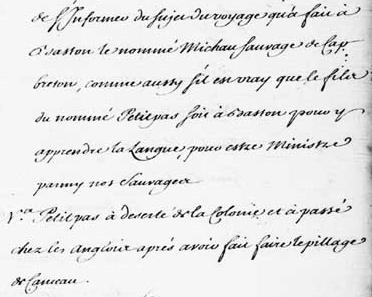 Excerpt translated freely: It is recommended that he inform himself about the trip to Boston, that the Indian from Cape Breton named Michau did, and also if it is true that the son of the one named Petitpas is in Boston to learn the language, to be a minister amongst our Indians.
Excerpt translated freely: It is recommended that he inform himself about the trip to Boston, that the Indian from Cape Breton named Michau did, and also if it is true that the son of the one named Petitpas is in Boston to learn the language, to be a minister amongst our Indians.
So there! Petitpas has deserted the colony and went to the English, after he had the looting of Canceau done.According to documentation reviewed during this research, Nicolas Petitpas was not reprimanded or punished for the allegations against him or his alleged involvement at Canceau in September 1718. Apparently, Nicolas had substantial loss due to the confiscation by the English. By the way Nicolas’ father was Jacques Petitpas. He along with his father in-law Jean Serreau de Saint-Aubin were in very high regards with France and its colonies. In 1692, they put themselves and their families at great risk to save Saint-Castin from being murdered. Saint-Castin was a French military officer who became a Abenaki Indian Chief. Their declaration regarding the incident can be viewed in a documentB19 at LAC Website. An account of their heroism is found in Saint-Castin’s biography, Paragraph 12 at DCB Online.
Also, during this research no documentary evidence was found that Claude Petitpas II's son Barthélemy was involved and assisted Captain Smart. In Barthélemy Petitpas' biography at DCB Online in paragraph 3, it says: “When he assisted Captain Thomas Smart* in the expulsion of a group of French fishermen from Canso in 1718 Petitpas was firmly in the British camp.”.
Claude Petitpas II’s biography Continued – The Mi'Kmaq Question Considered
The statements about Claude Petitpas II helping the English (in the biography of Claude Petitpas II at DCB Online) seems to lack in understanding of Claude II's and his sons Commitment to the Mi'kmaq Nation. There also seems to be an understatement of the effect that Acadian governing factors would have had on their existence. There were other Acadian educators, interpreters and negotiators who were close and very helpful to the English during that era. Non-cooperation would have resulted in sure imprisonment, exile or quite possibly, death. Needless to say, they would have been risking the loss of all their possessions. Acadians living in Acadie (Nova Scotia) were under English rule of law after the signing of the Treaty of Utrecht (March 31 – April 11, 1713). The English found some people to be very useful. Likewise during the Exile time, Father Pierre Antoine Simon Maillard was able to save some of Les Nommés Petitpas having special skills.Furthermore, it appears from this research that the method in writing Claude Petitpas II's biography at DCB Online was from a French perspective and lacking in objectivity towards Le Nommé Petitpas, which will not be addressed at this time. Historians need a clear unbiased understanding and recollection of the dreadful monopoly type game of ownership that the French and English royalty were playing. This play caused needless deprivation, suffering and death of Acadians and Native Americans, and the surrender of their homeland. The issue of the personal ramifications of the Treaty of Utrecht need to be considered and conveyed to the audience. They all were just trying to survive and make best of the changing political climate.
The biography of Claude Petitpas II (at DCB Online) ends by referring to a statement by no other than William Shirley “In 1747 Governor Shirley of Massachusetts called Petitpas a “faithfull subject of the crown of Great Britain . . . [who] had received marks of favour from this government for his services.””. What the biographer is not telling the reader is that the statement was likely derived from the above document where William Shirley is trying to justify the death of Claude Petitpas II's son Barthélemy. This is described commencing at above paragraph (P2.P12) and in the excerpt of page 379 reference from the Collection de Manuscrits Relatifs à la Nouvelle-France Vol. III.
Also, the biography at DCB Online does not reveal that Claude Petitpas II served France as their official Interpreter for the Indians in the colony of Île Royale.In short, considering Claude II’s complex position as an interpreter, one cannot omit considering all these important factors before concluding that he was not worthy of a respectful official remembrance.
Claude Petitpas II and Sons Living Under English Domination
There were 10 summariesG5 of French Governmental records about Les Nommés Petitpas at: The Louisbourg Institute of Cape Breton University - The Official Research site for the Fortress of Louisbourg. One must keep in mind that these records are when Claude Petitpas II is under English domination. He was living in Acadie (Nova Scotia). This territory or land belonged to Great Britain according to the Treaty of Utrecht (March 31 – April 11, 1713). Also, Claude Petitpas II was born and lived in Acadie (Nova Scotia) most of his life. The French Authority acknowledged this in their letters, that these events took place when he lived in Canceau (Canso). This place was great for fishing on the Acadie Canceau (Canso Nova Scotia) side of the bay. These letters show disputes over fishing and about Les Nommés Petitpas because the Governor M. de St Ovide of Île Royale (now – Cape Breton Island) thought they were trying to align their (of the French) Indians of the Missions to Great Britain.The reference in the next 3 documents to “Le Nommé Petitpas” is probably Claude Petitpas II. Excerpts of the summaryG6 of letter dated December 10, 1718 at the Website (some issues of June & October, 1718) states this:P3.P21
“-M. de St Ovide a prévenu les habitants français des prétentions anglaises sur Canceau et qu'ils se tiennent prêts d'en sortir et de faire transporter leur poisson sur l'Ile Royale, s'il apprenait par des nouvelles de France ou d'Angleterre que cette cession était due à l'Angleterre.
- Il leur a ordonné de venir s'établir avec leurs familles, au Port Toulouse ou aux environs, dès la fin de la pêche, persuadé que les Anglais en sortiraient aussi, par crainte des sauvages, qui ne sont retenus que par le nommé Petitpas, habitant de l'Acadie, qui a un empire absolu sur leur esprit et les fait commercer avec les Anglais.”:Above translated freely:: - M. St Ovide warned the French inhabitants of the English claim about Canceau, and for them to be ready to leave and transport their fish to Ile Royale, if they learn by news from France or England that this session was due to England.
- He ordered them to come and establish themselves with their families at Port Toulouse or nearby at the end of the fishing season, persuaded that the English would leave too having fear of the Indians, who are retained only by the one named Petitpas, inhabitant of Acadie [Nova Scotia], who has an absolute empire on their minds and makes them trade with the English.”“Ordre a été donné à M. de la Ronde, qui commande au Port Toulouse, d'envoyer prendre le nommé Petitpas, qui n'a pas voulu se retirer de Canceau, malgré les ordres, et y reste pour servir de sauvegarde aux Anglais, contre les sauvages.”:
Above translated freely: Order was given to M. de la Ronde, who commands at Port Toulouse [French domination] to go and take the one named [Nommé] Petitpas, who would not leave Canceau [English domination], in spite of the orders, is staying to serve as a safeguard for the English against the Indians.
The LAC Website has a copy of the original handwritten documentB20 (see items 9, 10 & 14) or below excerpts:
Note: The above dated December 10, 1718 letter is quite long (20 pages). There is no accusation that Claude Petitpas II assisted the English or Captain Cinare (Smart) during the September 1718 Canceau pillage.
The letter dated September 20, 1719 still places Claude Petitpas II as a resident of Canceau under English domination, and M. St Ovide the Governor of Île Royale (French territory) issuing orders to take him was not successful. LAC Website has the handwritten documentB21 (see items 5, 6 & 7) or below excerpts:
Above transcribed freely: Ayant eté informé au havre du St Esprit que Le Nommé Petitpas habitant de L'Acadie qui s'est habitué à Canceau – venait d’arriver de Baston ou les Anglois lui avaient donné 2000# de gratiffication [gratification] pour attirer à eux les Sauvages qui nous sont attachés, ci fur ce qu’il aprit en même tems qu’il avait au Port Toulouse et aux Isles Madame quelques chefs de ces Sauvages, il s’y rendit et leur parla, ils lui parurent fachés du peu d’attention que le Roi avait pour eux, qu’ils n’avoient presque rien en depuis trois ans, qu’eux et leurs familles [?] faim faute de poudre et de plomb, et pas vue aussi [? d’aide] pour habiller leurs enfants. Il leur promit qu’il aurait son attention particuliere à tous faire distribuer ce qui leur serait envoyé et qu’en son particulier il donnerait tous les secours qui dependent de lui, il à appris qu’ils s’etait retirés chez eux assés content et qu’ils n’avoient pas voulu ecouter les propositions qui leur eté faites par le [? nommé] Petitpas
Na les presens [présents] leur sont envoyés regulierement. Il n’y que l’année derniere qu'une partie à resté en France à cause du relache du Chercule, mais tout à eté envoyé par le Dromadaire.
Il avait donné orde detacher de prendre Petitpas avec ses enfants mais ayant à ce qu’il croit un avis, il s’est retiré à la costede l'Acadie.Above translated freely: - [M. de St Ovide the Governor of Île Royale] Was informed at the havre du St Esprit that the one named Petitpas inhabitant of Acadie, who got accustomed to Canceau, just came back from Boston, where the English gave him 2000# of bonus to lure to the English the Indians that are attached to us [France]. What he learned at the same time that there were at Port Toulouse and at Îles Madame a few chiefs of these Indians, he went there and talked to them. They appeared mad about the little attention given and had for them by the King. They nearly had nothing since three years. That they and their families [?] hunger from lack of powder and lead and did not see [?] to clothe their children. He promised them that they would get his attention, to have everything distributed that was sent and particularly he will give all the assistance that depends on him. He learned that they returned home satisfied enough and that they did not want to listen to the proposition made to them by the one named [Nommé] Petitpas.
[Comment by the Council] Na the presents are sent regularly. There was only last year that a part stayed in France because of the slacking of the Chercule, but everything was sent to by the Dromadaire.
[M. de St Ovide] He gave a detached order to take Petitpas with his children but what he [M. de St Ovide] believes was a warning, he [Petitpas] went to the coast of Acadie.Also, there was a summaryG7 of this French document at the Official Research Site for the Fortress of Louisbourg. An excerpt of the summary indicates this about Le Nommé Petitpas:P3.P21
“- Petitpas. - Entente avec les sauvages.
- M de St Ovide dit avoir appris au havre du St Esprit, que le nommé Petitpas, habitant de l'Acadie, qui habite Canceau, venait d'arriver de Boston, ou les Anglais lui avaient donné 2000# de gratification pour attirer aux Anglais les sauvages qui sont attachés à la France. - Ayant appris qu'il y avait au Port Toulouse et aux îles Madame quelques chefs de ces sauvages, M de St Ovide, s'y est rendu, et leur a parlé. Il a entendu leurs plaintes sur le peu d'attention que leur porte le Roi, sur le manque de nourriture et de vêtements, et leur a promis de les soulager par une distribution de tout ce qui serait envoyé pour eux. - Les sauvages se sont retirés assez contents et ont refusé d'écouter le nommé Petitpas. Celui-ci ayant eu avis que M. de St Ovide voulait le prendre, avec ses enfants, s'est retiré à la côte de l'Acadie.”Above translated freely:: Petitpas – Understanding with the Indians. - M. de St Ovide [M. de St Ovide the Governor of Île Royale] said he heard at the havre du St Esprit that the one named [Nommé] Petitpas inhabitant of Acadie, who lives at Canceau, just came back from Boston, where the English gave him 2000# of bonus to lure to the English the Indians that are attached to France. Finding out that there were at Port Toulouse and at Îles Madame a few chiefs of these Indians, M. de St Ovide went there and talked to them. He heard their complaints regarding the little attention given by the King, lack of food and clothing, he promised to satisfy them by a distribution of everything that will be sent for them. The Indians left content enough and refused to listen to the one named [Nommé] Petitpas. This person [Le Nommé Petitpas], finding out that M. de St Ovide wanted to take him, with his children, went to the coast of Acadie.
Claude Petitpas II worked hard and was a well-liked leader among the native Indians. The French records show that during the fishing harvest on the Canceau bay of Acadie (Nova Scotia) he was the leader responsible and caring for 100 sailors. The French were saying he was the chief of these men.
Records reviewed during this research indicate that Barthélemy Petitpas emigrated before 1718 to the colony of Île Royale under French domination. His father Claude Petitpas II emigrated sometime before 1725.
Claude Petitpas II and Sons Living Under French Domination
M. St Ovide continued to suspect him along with two of his younger sons (not Barthélemy) about being more English than French. M. St Ovide was fixated with concern that Claude II and his two younger sons would lure away France’s Indian allies to form an alliance with Great Bitain. Claude II's biography at DCB Online in paragraph 5 says that the Governor: “Saint-Ovide therefore tried to send him to France towards the end of that same year, with two of his sons by his first marriage, in order to get rid of him.”. This was not correct according to the letter sent by the Governor. However, the Governor appeared to have his hands full with Claude II's sons and he did expel them. In this letter M. St. Ovide says they are very strong navigators and itis about ten years ago that one of their brothers was sent to France for about the same reason. This letter along with other documentation reviewed gives a strong suspicion that Barthélemy was not the other brother sent to France. As previously mentioned the other brother who was sent to France and expelled in 1722 appears to be Isidore the youngest of the four first brothers.Although the letter doesn't mention their names, the young sons who would be old enough names were Paul & Joseph. It must be noted that the mother of these young sons of Claude Petitpas II was Marie-Thérèse, a Mi'kmaq Native American. Thus, like their father, they were very well-liked and influential within the Mi'kmaq community. This document is at the LAC Website.
The documentB22 at the LAC Website is dated November 3, 1728. The document description is somewhat confusing when the original letter of 23 pages is read. The writing style is unclear and difficult to understand. Also, some words are hidden where the image pages join at the center binding of the document. One of those words is on folio 67v (item 2) of the document. The document center binding after the word attack hides the next word. However, on page 33B8a of Author Isabelle Ringuet thesis partial blanked transcribed excerpt of the letter, it indicates “ataquer Canceau” which means “attack Canceau” in English. Also, in brackets of the excerpt it says that the missionary M. Gaulin was the person who informed M. St. Ovide in the spring. A closer review of the original document copy and of a written transcription of the original document was done during this research. LAC has this explicit hand written transcription on microfilm (reference information is: MG1-C11B, volume 10, p. 79-89, bobine C-9292) of the original document. It turns out that the person who informed M. St. Ovide in the spring was not missionary M. Gaulin rather missionary M. Courtin. The transcriber’s style of writing of the original document helped to clarify most of the unclear words. However the word Canceau relating to “ataquer Canceau” is still unclear. It appears that this transcription word looks more like Canada than Canceau, which is not reasonable considering English and French claimed territory at that time. Possibly the original document, which is in France, would clarify this word in question:

The LAC MG1-C11B, volume 10, reel C-9292E3 is now digitized at Canadiana Héritage by CRKN.
The following excerpts of folios 67, 67v, 68, 68v & 69 are relating to Claude Petitpas II and two of his sons whose mother was Marie-Thérèse:P17.P9
Above translated freely:
Iles Royalle
M. de St Ovide November 3, 1728
Monseigneur
I would have had the honor to inform you last fall of a considerable assembly of Indians that took place at Artigognich that we couldn't learn its reason. I wrote to Mr. Courtin their missionary to go to this place where he should have past the winter and try to discover the reason for this assembly so that I could be informed, but bad weather did not allow him to leave here. He informed me [to M. St Ovide] this spring that the Indians had held great advice. The opinion of most of the Elders [Indians] said they would have went and attack
[?Canceau?] but their young people were opposed being corrupted by two young sons of "le nommé Petitpas" [Claude Petitpas II], French and since three years has left Canceau and lives at Port Toulouse who in the past married an Indian women which of they got out. This was not discovered until after most of the Indians left Artigognich. I would really like to persuade Monseigneur that the father and his two children are much more English than French, and since a long time I would have sent them to France, if we did not have fear that this would create bad effects for us with the many Indians that they are allied to. However, during the tour that I just did, they made me aware that these youths are very suspicious to them, that they have already wasted the spirit of their youth and every time they go to Canceau, it is to inform the English of everything that takes place amongst them. That the father with his two children are moving in the fall to Chedabouctou land of Accadie [Nova Scotia] near Canceau to be more stationed to know everything that would takes place among the Indians. They begged me in grace to remove from this country these two youths in a way they no more appear, without that they cannot find a place to keep them safely. I gave order to M. Chevallière to inform me if the father and his two children [youths]were making any movement to go some other place. This Officer wrote to me that they were gone to build a house at Chedabouctou. That made me aware that everything the Indians said about these young people was with foundation. P10.P11 P21.P3This is what made me arrest them to have them transferred to France. I gave them, Monseigneur, and are in the hands of M. Conteneüil so he will hand them over to M. de Beaucharnois to send them to Rochefort [France]. I ask of you Monseigneur that you will give your orders to make sure these two young people don't appear in this country again. They are very strong navigators, and it is about ten years ago that one of their brothers was also sent to France for about the same reason.The letter is quite long, there are other issues in this letter – Two issues were the distributions of presents from the King of France to some 130 Indians, and Indians burning peace agreement papers that the English offered them. Another one was that a chief and the Elders have a lot of youths in villages in Acadie and Bay Des Challeurs and Miramichi, and at the first conference, M. St Ovide made them aware he was unhappy with some of the Indians because they stayed with the English.
It appears from the above letter dated November 3, 1728 and the letter dated December 10, 1718 that the French Authority was trying to control and encourage wrongly an Indian population. Many of them didn't live in the French colony Île Royale. The Indians mostly lived in Acadie (Nova Scotia) which was ceded to Great Britain by the signing of the Treaty of Utrecht in 1713. If the above highlighted French word meant attack Canceau then Les Nommés Petitpas were very much justified in discouraging the younger Indians to not attack the English in Acadie [Nova Scotia] for personal, moral and racial reasons. Their actions saved lives and probably prevented an another outbreak of war between Great Britain and France. Eventually, this may have been noticed by France. It may have been one reason why French Authority became confident with Les Nommés Petitpas.
Another reason could be that M. de St. Ovide the governor was absent from Île Royale for about 11/2 years. In his biographyA10 at DCB Online, (paragraph 11) it states "the governor’s return to France from late 1729 to mid-1731.".Although in contrast, it may be that Claude Petitpas II was a shattered man. He now had three sons from his first marriage in exile. It may well be that he had no choice in his emigration to the French colony of Île Royale, and thereafter becoming the appointed Official French Interpreter for the Indians. That is if he ever hope to see his sons again.
Charles de saint-Étienne de la Tour IIA11 was the Official French Interpreter for the Indians until his death in 1731.Attention must be given to something else about M. de St Ovide’s letter of November 3 , 1728. As mentioned above the person that had complained about le Nommé Petitpas’ two sons was not M. Gaulin a Missioner for the Indians in Acadie [Nova Scotia] rather the Missioner M. Courtin. As translated above at P17.P4, M. St Ovide accused them of corrupting the young Indians to not attack and “every time they go to Canceau, it is to inform the English of everything that takes place amongst them.”. This was at the ending of Great Britain’s declaration of war with the Mi’Kmaq Indians.
The other side of the coin, when war had been declared with the Mi’Kmaq Indians in 1722, M. de Bourville (his biographyA12 is at DCB Online) then the acting Governor of Île Royale sent a document file dated December 28, 1722 to the Minister in France. M. de Bourville wrote that M. Gaulin was writing to Monsieur to inform him of everything that occurred between the English, the inhabitants of Acadie [Nova Scotia] and the Indians. Also, a closer review of the original document copy and of a written transcription of the original document was done during this research. LAC has this explicit hand written transcription on microfilm (reference information is: MG1-C11B, volume 6, p. 80-88, bobine C-9292) of the original document.
In this same document file dated December 28, 1722, M. de Bourville wrote:
Translated freely:
I advised the council of the declaration of war made by the English to the Indians, and I sent him the copy and I am not informing him of nothing else. I returned it back to Monsieur Gaulin who tells about his mission and the troubles that he is aware, and to you Monsieur has a recent bundle of letters from father Félix which without a doubt informs you of all that Monsieur de Pensens wrote to me, that the petits pas' went into the cabin of an Indian named Michau with brandy and made him drink. And they made him believe a non-truth that Monsieur de Vaudreüil had armed the Indians to go and party at [in english territory] the English and they even meddled in the French party. He informed me that this action strongly irritated the Indians against the said petits pas’. They asked him to have them arrested or to allow them to break their heads, regarding them as traitors that they were.
[In the document’s page margin there is this statement:]
The cause is that several of their brothers were killed and massacred by the English. He assures me that this is a strongly dangerous family and that it would be to wish that they were put in prison.This is not hard for me to beleive.The Petitpas surname appears to be spelled as "petits pas" and without first names. Also, they appear to be living in Acadie (Nova Scotia). There is no document clue or fact to indicated that the "petits pas" family in question was Claude Petitpas II and his family. Lac Website has the document fileB23 (see item 3):
The above document may not be relating to Claude Petitpas II and his immediate family but France exiled his youngest son about that time in 1722. Furthermore what the petits pas family told the Indian named Michau was the truth, Monsieur de Vaudreüil had armed the Abenaki Indians.
Monsieur de PensensA13 & Monsieur de VaudreüilA14 biographies are Online at DCB.
In addition, historically this reference file gives a good idea of what Great Britain expected from Acadians during the declaration of war with the Indians; and of the influence that the missioners M. Gaulin and M. Félix Pain had with the French authority:- regarding the Acadian’s destiny and the expectation of their loyalty to France while living in Acadie [Nova Scotia] after the Treaty of Utrecht.
- and their apparent reason of association and influence with the Indians.
Gaulin'sA15 & Pain'sA16 biographies are Online at DCB.
Ironically, in 1717, Philippe de Pastour de Costebelle (his biographyA17 is at DCB Online) the Governor of Île Royale prior to his death that year wrote this to French Authority: “c'est une famille [famille de Claude Petitpas II] alliée par le sang avec les sauvages de nos missions. Il est bon de leur marquer notre confiance”
Above translated freely:: “they are a family [family of Claude Petitpas II] allied by blood with the Indians of our missions. It would be good to show them our confidence”
This summary transcriptG8 of the document was available at Website: The Louisbourg Institute of Cape Breton University - The Official Research Site for the Fortress of Louisbourg.
Beneath, there is the complete summary of the document which below it has been translated freely for this research:10 avril 1717
Description
Lettre de M. de Soubras
Date: 8 janvier 1717
Sujet: Sur le havre de Canceau
- Par le traité de paix, le Roi de France a abandonné ce havre à l'Angleterre, et a défendu aux Français d'y faire la pêche ou la troque.
- Les deux nations continuent tout de même à y commercer en commun
- Ce ne peutent être que ded mauvais Français qui se hasardent à courir le risque de punitions et leurs chefs sont un nommé Petitpas et son gendre LaSonde.
- M. Gaulin missionnaire a fait en 1716 sa pêche dans ce havre de Canceau, il ne convenait guère à un missionnaire de s'établir dans un endroit aussi suspect
- M. de Soubras est d'avis qu'il faut qu'il soit défendu par de nouveaux ordres qu'aucun Français n'y fasse la pêche ni la troque
Note du Conseil: "Communiquer à M. de Costebelle"
Réponse de M. de Costebelle:
- les côtes qui forment le passage de Canceau ne sont avantageuses pour la pêche que dans la partie sous la domination anglaise.
- Il y aurait de grands avantages à un échange commercial entre les deux nations et M. de Costebelle croit "qu'il y aurait un milieu à prendre qui ne devrait former aucun obstacles ruineux à notre nation, qui serait de tolérer un commerce des Anglais à nous uniquement pour les denrées qui sortent de la Nouvelle Angleterre et qu'il nous fut permis d'aller chez eux comme à eux de venir chez nous."
- S'il faut en croire leur serment de fidélité pour la nation française, les nommés Petitpas et LaSonde n'ont jamais été invités par les Romains. Quant à leur commerce, la chose est douteuse car c'est une famille alliée par le sang avec les sauvages de nos missions. Il est bon de leur marquer notre confiance
Note du Conseil: "Faire de nouvelles défenses encore plus fortes de tout commerce étranger.Above translated freely:
April 10, 1717
Description
Letter from M. de Soubras
Date: January 8, 1717
Subject: About the Port of Canceau
- By the treaty of peace, the King of France abandoned this port to England, and he forbade the French to fish and trade there
- the two nations nevertheless continue to trade together
- This can only be bad Frenchmen who venture to take the risk of punishment and their chiefs are the one named Petitpas and his son-in-Law LaSonde.
- M. Gaulin missionary in 1716 did his fishing in this port [bay] of Canceau, it was hardly not advisable for a missionary to establish himself in an area that is so suspicious
- M. de Soubras opinion that is must be prohibited by new orders that no Frenchmen does fishing or trading
Note from Council: “Communication to M. de Costebelle”
Answer from M. de Costebelle:
- The sides that form the passage of Canceau are not advantageous for fishing except in the area under English domination
- There would be big advantages to a commercial exchange between the two nations and M. de Costebelle believes “that there would be a medium [road] to take that would not form any ruining obstacles to our nation that is to tolerate a commerce with the English with us exclusively for the foods that come from New England and we are permitted to go to their place like they are allowed to come to our place.”
- If we have to believe their oath of faithfulness to the French Nation, Les Nommés Petitpas and LaSonde were never invited by the Romans. As for their commerce, that thing is doubtful because they are a family allied by blood with the Indians of our missions. It would be good to show them our confidence
Note from Council: “Make new defenses that are stronger for all foreign tradeLAC Website has a copy of the original documentB24 that was used for the above summary. It is called “Le Conseil de Marine. Arrêt sur un mémoire de monsieur de Soubras au sujet du hâvre de Canceaux”. The document items are 1, 2 & 3:
M. de Costebelle knew that Les Nommés Petitpas were much more and had the ways of the Indians. This was so contrary to how his successor M. de St. Ovide portrayed Les Nommés Petitpas, as being much more English than French.
M. de Costebelle also, knew and respected that the fishing water area at Canceau belonged to the English. This was in accordance to the Treaty of Utrecht.It must be emphasized that at times Claude Petitpas II had worked as an interpreter and negotiator for many years. Most likely, he did this service at different times for the Indian population, the English and the French. But in 1727 and 1728 he was not France's Official Interpreter for the Indians. As stated previously, the person was a man named Charles de saint-Étienne de la Tour II who died in 1731. Afterwards, Claude Petitpas II was appointed the Official French Interpreter for the Indians. He held that post for a short time before he died in 1732 and his son Barthélemy did these duties for about 12 years until his death in 1747. The documentB25 at LAC dated November 16, 1732 uncovers the years they were appointed as interpreters. See item 5 & item 5v or the next excerpts:P7.P2
Above translated freely: The senior inhabitant nommé Claude Petitpas who since the death of M. de La Tour was serving as Interpreter died sometime after M. de St. Ovide did his tour this year. As his interpreter salary was not on the employment statement of expenses and M. St. Ovide had reason to be glad of his services. M. Le Normant had delivered to his widow who has 4 small children some supplies from the stores to help in her subsistence, and to substitute for the salary her husband earned.
They propose for Interpreter, Barthélemy Petitpas son of this inhabitant, and he is asking for himself the same salary that M. de La Tour earned. He holds a perfect command of the languages Micmak [Mi’Kmaq] and Amalécite [Malecite], and has all the qualities necessary to be a good interpreter. M. de La Tour was employed for 300 pounds in this position.
In the margin from the Council: Approve the 300 pounds [February 10, 1733].To be perfectly clear about the letter dated November 3, 1728, the point conveyed here is if the Governor M. de St Ovide was alone at the Assembly that year it was not due to Claude Petitpas II. Only reading the document description could lead someone to think that Le Nommé Petitpas was avoiding his duty as an interpreter.
No Evidence Found That Barthélemy was a Guest of The English
In addition, Barthélemy's biography at DCB Online in paragraph 3, it states: “He spent the next three years as a guest of the English in Boston, perfecting his English, and returned late in 1721 to become the official British agent among the Micmacs in Nova Scotia. Philippe de Rigaud* de Vaudreuil and Michel Bégon reported that the intention was for Petitpas to return as a Protestant missionary among the Micmacs, “to win over this nation and make it change its religion.””How can Barthélemy Petitpas be the person returning from Boston in late 1721? He was involved with other affairs and transactions during that year. A copy of the original court sentence documentB26 of 4 pages dated November 4, 1721, was requested for this research from LAC Website. It indicates that Barthélemy Petitpas:
- was a resident of Port Toulouse and issued a passport for his schooner on January 1, 1721.
- used that passport to do his summer fishing.
- went to Port Dauphin and then to Canceau.
Under interrogation, Barthélemy Petitpas said if he arrived in this port without a passport it is because he came from Canceau where hehad to take the [other] ship and cargo. This was in partial payment for two years of navigation service he did for Captain Richard. Barthélemy goes on to say in his testimony that he left this area with the governor's permission.
Barthélemy Petitpas did not win his appeal of November 5, 1721 which was decided in 1722. This was mentioned in (P9.P1). The reference documentsB27 that Eric Krause refers to for his summary of the court proceedings are available at LAC Website:In short, Barthélemy was charged because the order [law] required that the Captain must get another passport if a changing of ship and transfer occurs. On his vessel, he had some Englishmen as part of his crew and merchandise not cultivated in the country.
Stories About Les Nommés Petitpas
There are many stories from one extreme to the other about Les Nommés Petitpas.Barthélemy Petitpas, around 1740 in French territory at Port Toulouse, on one occasion is credited for saving Edward Howe, a Nova Scotia Official from possible serious injury. Edward Howe was making fun of the Indians by ridiculing their religious faith. The recountA18 is found in Étienne Bâtard's biography in paragraph 2 at DCB Online. Ironically during this research, a man named "Ed Howe" appears on a reviewed Indian treatyH10.
These stories or references about the preceding mentioned three men appear to come from a book written in French titled Les soirées canadiennes published in 1863. Pages 289 to 426 has M. l’abbé Maillard's transcribed manuscript which is not dated. However Father Maillard wrote that English officer named captain Hau (Howe) was killed in 1751. According to the transcription, Father Maillard had promised Madame de Drucourt (who was the wife of the governor of Île Royale) more detailed information about the Indians of these parts of the country. This was in regard to their religion, their manners and customs before they professed Christianity. He forwarded to her a two year old copy of a long letter on that subject which he had written for their superior M. de Lalane in Paris. Also, Father Maillard must have wrote his manuscript sometime between the years of 1754 and 1758 during the time Madame de Drucourt (Drucour) lived at Île Royale. The copyright to this book mentioned has expired and entered the public domain. A digital copy of the documentD6 is available for reading and download at Google Books Search Website. The detailed encounter between Edward Howe, the Indians and their interpreter Barthélemy Petitpas is from pages 388D6a to 404D6b. Pages 404D6c to 407D6d tells the way Étienne Bâtard killed captain Hau (Howe). There are several other places in Father Maillard's manuscript where there are references to the Interpreter for the Indians. One reference is on page 310D6e, that is after the storyteller Mi'Kmaq elder man named Arguimaut gave a lengthy account to questions that Father Maillard had asked him. Afterwards, he proceeded to asked some questions of his own to Father Maillard who said the following:
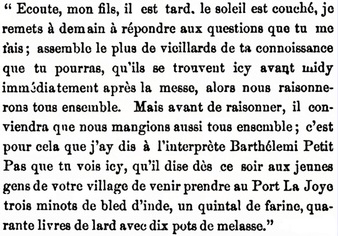 Excerpt translated freely: “Listen, my son, it is late, the sun is down, I defer until tomorrow to answer the questions that you make to me; assemble most elder men that you know and can. That they come here before noon immediately after the mass. Then we shall reason all together. But before reasoning, it will suit that we eat all together. That is why I said to the interpreter Barthélemi Petit Pas [Petitpas] that you see here, that as soon as this evening he tell the young people of your village to come to take at Port La Joie three minots of Indian corn, one quintal of flour, forty pounds of pork with ten jars of molasse."
Excerpt translated freely: “Listen, my son, it is late, the sun is down, I defer until tomorrow to answer the questions that you make to me; assemble most elder men that you know and can. That they come here before noon immediately after the mass. Then we shall reason all together. But before reasoning, it will suit that we eat all together. That is why I said to the interpreter Barthélemi Petit Pas [Petitpas] that you see here, that as soon as this evening he tell the young people of your village to come to take at Port La Joie three minots of Indian corn, one quintal of flour, forty pounds of pork with ten jars of molasse."Claude Petitpas II cuts off the head of an Indian who was trying to escape by jumping into the sea. The author refers to Claude II as a Frenchman rather than an Acadian. Mixed into the story appears to be a translated embellished recount where M. de St. Ovide “has found means to get this young man [Petitpas] out of the hands of the English.” Surprisingly, this story or tale was really a letter dated October 17, 1722 by Vaudreüil and Begon. It was first read in English from an old digitized book from the Internet. At the time, it was thought that the letter might be only a more recent embellished illusive tale, and not coming from the Governor of New France M. Vaudreüil and his Intendant M. Begon. The translated letterP11.P5 to English dated October 17, 1722 is from the DOCUMENTS RELATIVE TO THE COLONIAL HISTORY OF THE STATE OF NEW YORK. The specific translated documentH5 was used in 1925, by Emma Lewis Coleman, see reference 60 on page 98: Vaudreuil and Bégon to Council of Marine N.Y., Docs., IX, 912. Emma Lewis Coleman for reference 60 on page 98 wrote:
“but a letter sent from Quebec to Versailles in 172260 tells us that Barthélemy son of Claudius was in Boston three years [.....]”. The document (H5) doesn't tell us that the young man was Barthélemy Petitpas. The young man was not referred to by his first name. As said above, Claude Petitpas II and Marie-Thérèse had four sons. In 1722, Barthélemy would be close to 35 years old, which would seem in those times, would not to be considered and referred to as a young man. Other sons would be: Paul about 27 years old and Joseph 23. The youngest son would be 19 year old Isidore.
Emma Lewis Coleman's footnote reference 60 on page 98: “Vaudreuil and Bégon to Council of Marine N.Y., Docs., IX, 912” is dated October 17, 1722. There are some original excerpts of this letter at LAC Website. The content of the documentB28 are memoirs for the King of France which has missing text of the original letter, some being all the information about Petitpas the Frenchman and his young son.
Although these types of stories may well be entertaining for some people, however from a historical perspective, it is the view from this research that accuracy is necessary. Third party reference information should be verified with its original research material for errors.
Barthélemy Petitpas' Biography Research Continued
In Barthélemy Petitpas' biography at DCB Online in paragraph 4 it states: “In 1722 Saint-Ovide sent him to the seminary of Quebec”. A request was made to the Séminaire de Québec for original documentation. This was relating to a young man named Petitpas who apparently attended the seminary of Quebec in 1722, possibly there was a document that showed his first name. Their reply was that the Séminaire de Québec did not have their colonial records. They said to contact Division des archives de l'Université Laval Pavillon Jean-Charles-Bonenfant.Their direction was to contact the Musée de la Civilisation who has the Séminaire de Québec archives. They have two records about Louis Benjamin Peti[t]pas in the Seminary archives. However, Louis Benjamin Petitpas was Claude Petitpas II's son from his second marriage and was not yet born in 1722.
They checked the Seminary students record for the year 1722 etc., and found no trace of a Petitpas who was there or in attendance.
They did have an excerpt of a documentH6 dated October 17, 1722 from the Governor of New France M. Vaudreüil and his Intendant M. Begon to the Minister. A man named Petitpas was accused by Vaudreüil and Begon of killing an Indian (Extrait d’une dépêche de M. de Vaudreüil et Begon au Ministre, le 17 oct. 1722). This was a partial transcript from a copy of a copy of the original French letter dated October 17, 1722. The copy (from the work of John Romeyn Brodhead for the New York State in 1841) of the original French letter was used to translate the complete document from the New York State Library Cultural Education Center (translated and published by M. Edmund Bailey O'Callaghan about 1855-1858). This excerpt from the Musée de la Civilisation in French puts credence that the document used by Emma Lewis Coleman in 1925 was accurate. That is in translation from French to English and that the Young Petitpas' first name was not mentioned. As mentioned before she assumed the young man was Barthélemy Petitpas.In Addition, the transcriptions brought back from France by Brodhead were copied in 1845 for the Literary and Historical Society of Quebec. Then from this second transcription a copy was made in 1884 for the National Archives of Canada. A short time later a copy of the same documents was sent to the bureau du secrétaire de la province de Québec. LAC has a copy of these documents on microfilm C-13574, C-13575 & C-13576.
Also, LAC informed this research that a request could be made to them for a copy of the documentB29 dated October 17, 1722. The following is excerpts of the translation and transcription done back in the 18th century:Brodhead's 1845 Transcription Letter of October 17, 1722
O'Callaghan's 1855 Translation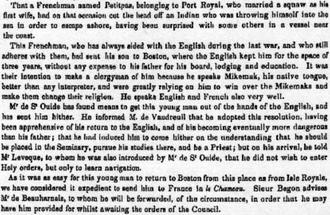
Above transcribed freely: That a Frenchman, named Petitpas, belonging to Port Royale, who married a sqaw as his first wife, had on that occasion cut the head off an Indian who was throwing himself into the sea in order to escape ashore, having been surprised with some others in a vessel near the coast.
This Frenchman, who has always sided with the English during the last war, and who still adheres with them, had sent his son to Boston, where the English kept him for the space of three years, without any expense to his father for his board, lodging and education. It was their intention to make a clergyman of him because he speaks Mikemak, his native tongue, better than any interpreter, and were greatly relying on him to win over the Mikemaks and make them change their religion. He speaks English and French also very well.
Mr de St Ovide has found means to get this young man out of the hands of the English, and has sent him hither. He informed M. de Vaudreuil that he adopted this resolution, having been apprehensive of his return to the English, and of his becoming eventually more dangerous than his father; that he had induced him to come hither on the understanding that he should be placed in the Seminary, pursue his studies there, aud he be a Priest; but on his arrival, he told Mr Leveque, to whom he was also introduced by M' de S' Ouide, that he did not wish to enter Holy orders, but only to learn navigation.
As it was as easy for this young man to return to Boston from this place as from Isle Royale, we have considered it expedient to send him to France in the Chameau. Sieur Begon advises Mr de Beauharnais, to whom he will be forwarded, of the circumstance, in order that he may have him provided whilst awaiting the orders of the Council.Many documents were read for this research, most of them in French. There was no other reference to Claude Petitpas II murdering an Indian.
Identifying The 1722 Young Petitpas & Two of His First Brothers
To continue, the Centre D'Études Acadiennes de Moncton provide information about 2 documents of interest. One 1728 document was about Isidore Petitpas requesting to return to his Country instead of serving in the Islands. Another document dated 1729 was about 2 sons of an inhabitant from Acadie called Petitpas who were sent to France by M. St Ovide the Governor of Île Royale. The Centre d'études acadiennes (L'Université de Moncton) said they do not have these documents in their archives and a request would need to be made to LAC.These documents were part of a series of documents called Letters of the intendants to the Court / Lettres des intendants à la CourB30. These letters are on four microfilms reels C-12878, C-12879, C-12880 & C-12881. The reference for the documents in question is MG6 C-1, sous-série 1E, reel C-12879. The microfilm reel has about a total of about 1954 French documents which are dated from 1712 to 1732.
There were 7 documents found and believed to be regarding Claude Petitpas II's son Isidore. One document dated January 6, 1729 (page 3) is probably concerning Joseph and Paul who are not referred to by first name. M. de Bauharnois (the Intendant at Rochefort) wrote that M. de St Ovide was obliged to send to France, two inhabitants from Acadie who were Petitpas brothers. He had them put in the l’escoüade volante [squad] of the port to subsist themselves. This was until Jean-Fréderic Phélypeaux, comte de Maurepas gave his orders in what to do about this issue. As remembered from above (P17.P5) in a letter dated November 3, 1728, two Petitpas brothers were sent to France.
Identifying the 1722 Young Petitpas & Two of His First Brothers Continued
After reading the prior specified French documents for this research enough documentary evidence was found to clearly show that Barthélemy Petitpas was mistaken for someone else in his biography at DCB Online. The person was his younger brother Isidore Petitpas. Copies of the 8 documents are listed below in the source section as B30a, B30b, B30c, B30d, B30e, B30f, B30g & B30h:In a letter dated December 1, 1722, Beauharnois wrote to the council (page 199) this:
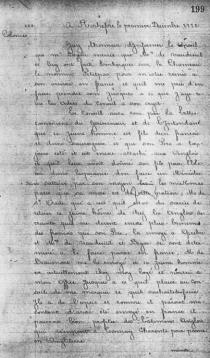 Translated freely:
Translated freely:
At Rochefort the first of December, 1722
I [Beauharnois] have the honour to inform the council that M. Begon wrote to me that M. de Vaudreüil and him made le nommé Petitpas [Isidore] embark on the Chameau [ship] to be given to me on his arrival in France, and selected me to take care of him until I receive orders from the council about him.
The council would have seen from the letter communicated from the Governor and the Intendant that the young man is a son of a Francois and an Indian woman [sauvagesse] and that his father was always attached and still is to the English. He gave to them his son to become a Minister and to attract by his way the micKmas because his mother is from that nation. M. de St Ovide who believed it was of service of removing this young man from the English fearing that he would become more enemy to the French than his father, sent him to Quebec and M. de Vaudreüil and Begon determined to send him to France. M. de Beaumont sent him to me and this young man is currently staying with me lodged and nourished at my office. Until it pleases the council to tell me what it wishes to do with him. He is clever and as he appears displeased to have been sent to France. He may well take advantage of the English ships that come to Tonnay-Charente to go to England.The above page 158 of the letter dated April 20, 1728 is prior to when Isidore Petitpas was sent to Martinique. He is asking to be sent back to his Country instead of going to the Islands to serve as a soldier.
In short, the above letters dated 1730, pages 142-143 & 145 refer to Le Nommé Isidore Petitpas as a native of Acadie. The Intendant wrote that Isidore has arrived in this city [Rochefort]. He asked that employment be found for him or the permission to return to his Country. The Intendant further wrote regarding:
- monthly pay when he was placed to work as a young pilot and his poor performance.
- M. de Bauharnois (the Intendant at Rochefort) sending him to Martinique to serve as a soldier.
- that he was put in prison.
- the decision by the Minister to not allow him next year in 1731 to board the ships of the King or the commercial ships destined to Québec and Île Royale.
More about Full Brothers Isidore, Joseph & Paul Petitpas
Also from LAC, the Letters of the Court to the intendants / Dépêches de la Cour aux intendantsB31 were reviewed. Seven letters from Jean-Fréderic Phélypeaux, comte de Maurepas to M. de Bauharnois were found. Five letters were regarding Isidore and two for Joseph & Paul. This was on two microfilms reels C-12876 & C-12877 which are listed below in the source section as B31a, B31b, B31c, B31d, B31e, B31f & B31g.The above last two documents in the list are Jean-Fréderic Phélypeaux, comte de Maurepas' orders to M. de Beauharnois regarding Joseph and Paul Petitpas.
In a letter dated January 18, 1729, Maurepas wrote (page 116) this:
![Hyperlinked small image (excerpt) to a larger page view at this Website of a microfilm document from LAC. This is relating to the one named Petitpas [claude Petitpas II] & two of his four sons from his first marriage [Joseph Petitpas & Paul Petitpas]](img-r/ijp116c.jpg) Excerpt translated freely: M. de St. Ovide made me aware of the reasons that made him obliged to send the two sons of the Nommé [one named] Petitpas. I approve that you had them put in the l’escoüade volante [squad] of this port to subsist themselves. It is of the King's service that they cannot return to l’Isle Royalle or to Quebec. Therefore, you are to have their conduct monitored. As M. de St. Ovide made me aware that they are good navigators.
You can have them embark on the vessels destined for the Islands, observing to recommend to the Captains to make sure that they cannot desert. If there is a few replacement required to the crew of the Baleine [name of vessel], and if they are not part of the reception of this dispatch, you can embark them.
Excerpt translated freely: M. de St. Ovide made me aware of the reasons that made him obliged to send the two sons of the Nommé [one named] Petitpas. I approve that you had them put in the l’escoüade volante [squad] of this port to subsist themselves. It is of the King's service that they cannot return to l’Isle Royalle or to Quebec. Therefore, you are to have their conduct monitored. As M. de St. Ovide made me aware that they are good navigators.
You can have them embark on the vessels destined for the Islands, observing to recommend to the Captains to make sure that they cannot desert. If there is a few replacement required to the crew of the Baleine [name of vessel], and if they are not part of the reception of this dispatch, you can embark them.In a letter dated June 14, 1729, Maurepas wrote to Bauharnois this:
![Hyperlinked small image (excerpt) to a larger page view at this Website of a microfilm document from LAC. This is relating to the one named Petitpas [claude Petitpas II] & two of his four sons from his first marriage [Joseph Petitpas & Paul Petitpas]](img-r/ijp183c.jpg)
![Hyperlinked small image (excerpt) to a larger page view at this Website of a microfilm document from LAC. This is relating to the one named Petitpas [claude Petitpas II] & two of his four sons from his first marriage [Joseph Petitpas & Paul Petitpas]](img-r/ijp184c.jpg) Excerpt translated freely: I wrote to you last January 18 to have embarked on the vessels destined for the Islands the two sons of the Nommé Petitpas that M. de St. Ovide judged about keeping them far away from Acadie and L’Isle Royalle. You will see from the petition that they addressed to me and I am sending you. That they are complaining that we are paying only 7# to each of them per month for the service they do in this port. I ask of you to tell me the reason why you have not embarked them on the Gironde or the Portefaix [vessels]. M. de St. Ovide made me aware that they are good navigators.
Excerpt translated freely: I wrote to you last January 18 to have embarked on the vessels destined for the Islands the two sons of the Nommé Petitpas that M. de St. Ovide judged about keeping them far away from Acadie and L’Isle Royalle. You will see from the petition that they addressed to me and I am sending you. That they are complaining that we are paying only 7# to each of them per month for the service they do in this port. I ask of you to tell me the reason why you have not embarked them on the Gironde or the Portefaix [vessels]. M. de St. Ovide made me aware that they are good navigators.Fate of the Full Brothers Isidore, Joseph & Paul Petitpas
The Joseph Petitpas referred to previously, mother was Marie-Thérèse. It appears he was a witness at his father’s second marriage to Françoise Lavergne in 1721. The Public Archives of Nova Scotia Canada has a recordH4a of their signatures on the register:It appears that Claude Petitpas II had two sons named Joseph, one son of the four sons from his first marriage to Marie-Thérèse and one son of the four sons from his second marriage to Françoise Lavergne.
There is only two Petitpas' that are named on the Île Royale 1734 censusF5 at Archives Canada-France. They are on the next two excerpts who are a carpenter named Nicolas Petitpas and France's Interpreter for the Indians Barthélemy Petitpas:There is a documentB32 at LAC about a voyage started from Louisbourg on February 5, 1752 by Sr De La Roque who was the land surveyor for the King of France. Item 16 of the 248 page document list the widow of Barthélemy Petitpas, Madeleine Coste and their children living with her. They are sons Jean Petitpas age 24, Pierre Petitpas 21, Claude Petitpas 18, Guillaume Petitpas 17, Paul Petitpas 12 and 14 year old youngest daughter Pelagie Petitpas. Below her name is Madeleine Petitpas and Joseph Petitpas' names and families. They are her and Barthélemy Petitpas’ eldest daughter and son:
Barthélemy Petitpas' son Guillaume Petitpas fled to Saint-Pierre et Miquelon after the 1763 Treaty of Paris. There is a chronicleH19 about his plight on this website.
There were five other Petitpas found listed on the document at LAC about the 1752 voyage by Sr De La Roque. Joseph Petitpas who lives with his then re-married mother Françoise Lavergne, Louis Petitpas Interpreter for the Indians, Jacques Petitpas, Jean Petitpas and Judith Petitpas. She is Claude Petitpas II's eldest daughter who is the widow of Marc LaSonde. The following 5 excerpts are the listings for them and their families:
A documentB33 at LAC dated November 4, 1751 tells that Comte de Raymond found it necessary to hire a second Interpreter for the Indians at Île Royale. He was referred to as only "le nommé Petitpas". However, he is Louis Petitpas according to the above mentioned census done by Sr De La Roque in 1752. The following excerpt is from folio 59v from the document:
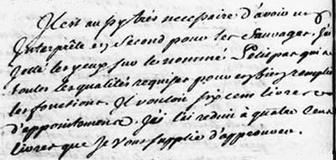 Excerpt translated freely: It is also very necessary to have a second Interpreter for the Indians. I set eyes on le nommé Petitpas who has all the required qualities to perform the functions. He wanted six hundred pounds as salary. I reduced it to four hundred pounds that I'm begging you to approve.
Excerpt translated freely: It is also very necessary to have a second Interpreter for the Indians. I set eyes on le nommé Petitpas who has all the required qualities to perform the functions. He wanted six hundred pounds as salary. I reduced it to four hundred pounds that I'm begging you to approve.The full brothers Paul, Joseph & Isidore Petitpas, sons of Claude Petitpas II & Marie-Thérèse were not found on the above Île Royale 1734 & 1752 censuses. Thousands of microfilm documents were reviewed from LAC and there was nil acknowledgment found that they returned to Acadie (Nova Scotia) or Île Royale society.
In regards to Isidore’s plight, the documents indicate that in 1723 he was to be trained as a pilot and then authority was to make him enter the service for the King of France. In the document (page 22) dated May 12, 1728, French authority confirmed Isidore’s poor health which would not permit him to serve as a soldier.
It is of no surprise during this research that further documentation was not found beyond the June 11, 1729 (page 183 & 184) about Joseph & Paul. Their predicament was that the comte de Maurepas (who took his order directly from the King Louis XV) wanted Joseph & Paul Petitpas sent to the Islands it would be very contrary to expectation that he would have to order M. de Beauharnois for a third time and hear of the them again.
Apparently, about one year prior to his death in 1732, Claude Petitpas II had named another son Joseph. This may have been Claude Petitpas II’s way of saying he knew the fate of Joseph & Paul Petitpas from his first marriage. The four sons from Claude Petitpas II's second marriage to Françoise Lavergne names were Jean, Jacques, Louis & Joseph.
It would be nice to know the fate of full brothers Paul, Joseph & Isidore Petitpas. However the knowledge of their life and final destiny is ongoing and for another time. If they wanted to live in Acadie (Nova Scotia) in their Country, their place of birth and near or amongst their people the Mi’Kmaq under the domination of Great Britain; the Treaty of Utrecht allowed them to do so. Unfortunately the French Authority did not see it that way, they exiled these native men probably for the rest of their life from their homeland Mi’kma’ki.
In April 2020, a web linkH18 was provided for a site with original documentation. Without an initial request from this research, via e-mail thread the new information was received from Stéphane Dallet in France. He wrote that they found in the registers of the Royal Navy Hospital of Rochefort the deaths notices of Joseph Petitpas and Paul Petitpas. They both were listed as Canadian squadron seaman. Also, he indicated that Joseph's old clothes were given to his brother Paul, then to the orphans when he too died. No trace of Isidore in the port of Rochefort, nor in the region. Furthermore, he informed that the archives of the Rochefort Royal Hospital are online and free to access on the website of the Departmental Archives of Charente-Maritime. You will find the acts of the Petitpas brothers in views 104H18a and 108H18b.
Joseph Petitpas entered the hospital on April 28, 1730 and died on May 17, 1730. Paul Petitpas entered the hospital on September 27, 1730 and died on October 24, 1730. The November 1708 Indian Census of Acadie tells that Joseph Petitpas was 9 years and Paul Petitpas 13 years old. Therefore, when they died Joseph was 31 years old and Paul 35 years old. Now it is known that these native men were exiled for the rest of their life from their homeland Mi’kma’ki. They survived only 2 years in a faraway land. See below two excerpts from the registers:


As seen above at point 22, in letter (142-143) dated September 14 1730 it said that Isidore Petitpas just arrived at Rochefort. He was asking that work be found for him. Again, he requested to be allowed to return to his country. He worked as a pilot in France from 1723 to 1728 until he was sent to Martinique. While in Martinique Isidore was put in prison and ordered that he be released by Monseigneur (Maurepas). However, at Rochefort they were scared that he would do something bad and he was put back in prison awaiting a decision from Monseigneur in what to do with him. As mentioned above at the end of point 22 about letter (145) dated October 3, 1730 it was decide by the Minister not to allow him next year in 1731 to board the ships of the King or the commercial ships destined to Québec and Île Royale. Next is a translation of the letter:
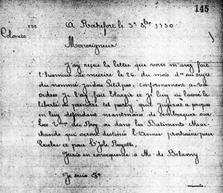 Translated freely:
Translated freely:
At Rochefort October 3, 1730
Monseigneur
I have received the letter which you did the honor to write to me on the 26th of last month concerning the one named Isidore Petitpas. In accordance with your orders, I have expanded it and I am giving him the freedom to take that party that he would consider appropriate nevertheless forbidding him to embark on the King's vessels or in the Merchant ships which will be destined next year for Québec and L'Isle Royalle.
I am writing accordingly to M de Belamy
I am . . .The three LAC microfilm reelsE4 for reference B30 (C-12879) and B31 (C-12876 & C-12877) obtained via interlibrary loan are now digitized at Canadiana Héritage.
It appear Maurepas may have had some regret or a change of heart about Isidore Petitpas. Maurepas was the person that ordered Isidore sent to the Islands to serve as a simple soldier on Beauharnois' recommendation. The document of 1727 and the letter (142-143) reveals that Beauharnois wasn't happy with Isidore's demeanor. It is not known if Isidore knew about his two brothers dying in the Rochefort Royal Hospital. Also, unknown is if he ever made it out of the prison in Rochefort alive.
To recap, the French authority were very concerned about and dreaded Isidore Petitpas. This was quit clear after reading their correspondences. This is emphatically shown in their letters of October 17, 1722, December 1, 1722 and December 15, 1722. It declares he spoke Miꞌkmaq, his maternal language better than any interpreter. Also, affirmed was that Isidore spoke English and French very well. They were afraid that Isidore Petitpas would favour the English and help them form an Alliance with the Miꞌkmaq. They said he was more dangerous than his father Claude II Petitpas. The French were watching Isidore extremely closely so he would not board English vessels. Isidore probably didn't know the true intention of the French in never letting him return to his native homeland.
Subsequently to Isidore's exile in 1722, they started paying him on about January 5, 1723 to learn and become a pilot according to the September, 1727 document. It indicated that he was nearly always sick during his last assignment on the Caisseau. When able-bodied Isidore was probably a capable pilot who the French didn't trust. He would be a very knowledgeable pilot or navigator like his older brothers; Joseph Petitpas, Paul Petitpas and Barthélemy Petitpas. The French authority recognized them as such in their letters. They had not received any French formal piloting training like Isidore Petitpas. What made these men brave, great and avid pilots or navigators could be inherited or be trace back and attributed to their ancestors. They had travelled the fresh and salt water ways in Mi’kma’ki (Acadie) for many thousands of years.
This may be considered in the thought to how brave and savvy they and their ancestors the Mi'Kmaq were, and in what you may not have heard the following story: Around the mid 1700s, Father Maillard was chatting (termed as reasoning back then) with an Elder Mi'Kmaq storyteller named Arguimaut. The subject was of how the Mi'Kmaq had prevented or avoided large sea creatures from ramming their large canoes over and becoming pray to those unfriendly sea creatures. The Mi'Kmaq storyteller said they would place a shrub/tree with lots foliage in their canoes when they travel in the Gulf of Saint Lawrence and the Atlantic Ocean to their habitat places. In doing so, the sea creatures would avoid coming close to their canoes. Today, someone could reason or say – good idea and smart on their part – tricking those silly sea creatures into thinking they would hit ground! The following website linked drawing “Les nommés Petitpas”H12 depicts honour and respect to them and their ancestors.
Substantial Errors and Omissions in Les Nommés Petitpas Biographies
As of this writing and demonstrated throughout this presentation, there are substantial errors and omissions in the biographies of Claude Petitpas II and his son (posted on the DCB Online Website). These biographies have been in the public domain for some time. The corrective method and plan needs to be determined. Furthermore as of this writing, according to Google Books, Emma Lewis Coleman’s 1925 New England Captives Carried to Canada book is available for purchase on the Internet from Heritage Books, Inc.. Page 97 & 98 can be previewed.Ideally it could be explained in a condense manner, the effect, the implications and the role the Treaty of Utrecht (March 31 – April 11, 1713) had on Les Nommés Petitpas. That is, the effect the treaty had on someone from that time in being distinct as an Acadian or a Native American. The hand dealt to them and others by the Royalty of Great Britain and France, and New England's William Shirley of that era should not go untold. Instead of putting them in camps, whether it was the English camp or the French camp, if one must use that term, this was a matter of geography in where they lived – Nova Scotia (Acadie) or Cape Breton (Île Royale) and the domination at that particular time.
Claude Petitpas II and his sons were very important to France's colonial interests which included its missions. It was of utmost importance to the French to have these men as Indian language teachers, interpreters and navigators.
In a documentB34 dated November 1, 1734, M. St. Ovide wrote to the French authority and disclosed the following about Barthélemy's importance (folios 139 - 139v):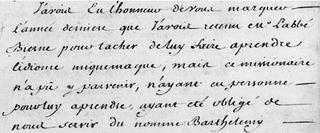
 Excerpt translated freely: I had the honour to advice you last year that I kept M. L'abbé [priest] Bierne to try to have him learn the miquemaque idiom, but this missionary was unable to achieve, having no person to teach him. We had to use the one named Barthelemy Petit-pas to serve as a pilot for the ship we sent to Nouvelle [New] York.
Excerpt translated freely: I had the honour to advice you last year that I kept M. L'abbé [priest] Bierne to try to have him learn the miquemaque idiom, but this missionary was unable to achieve, having no person to teach him. We had to use the one named Barthelemy Petit-pas to serve as a pilot for the ship we sent to Nouvelle [New] York.Another documentB35 dated November 3, 1734 states this regarding Barthélemy Petitpas financial situation and him being with the missioner at Mirliguech in Labrador (folio 90 - 90v):
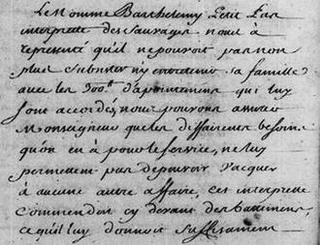
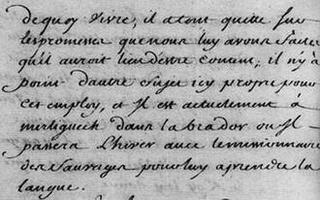 Excerpt translated freely: The interpreter the one called Barthélemy Petit Pas [Petitpas] told us that he also couldn't survive and support his family with the 300.# salary awarded to him. We want to assure monseigneur that the different needs that we have for this service doesn't permit him to be able to attend any other business. This interpreter commanded ships for years which gave him sufficient of what foods. He left everything on the promises that we gave him thus he would have reason to be satisfied. There is no other proper Subject here for this employment, and he is presently at Mirliguech in Labrador where he will spend the winter with missionary for the Indians to teach him the language.
Excerpt translated freely: The interpreter the one called Barthélemy Petit Pas [Petitpas] told us that he also couldn't survive and support his family with the 300.# salary awarded to him. We want to assure monseigneur that the different needs that we have for this service doesn't permit him to be able to attend any other business. This interpreter commanded ships for years which gave him sufficient of what foods. He left everything on the promises that we gave him thus he would have reason to be satisfied. There is no other proper Subject here for this employment, and he is presently at Mirliguech in Labrador where he will spend the winter with missionary for the Indians to teach him the language.Yet another documentB36 dated November 3, 1734 has the reply from the Minister. The first page has a date of January 25, 1735 which appears to be when the document was received in the colony of Île Royale. It indicates that Barthélemy Petitpas' salary raise was approved and doubled to 600 pounds (folios 12v - 13).
This documentB37 dated November 5, 1734 says the interpreter (Barthélemy Petitpas) stayed at the mission of Mirliguèche in Labrador with Father Saint Vincent to teach him the Indian language (folios 211 - 211v):
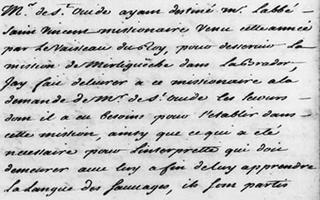
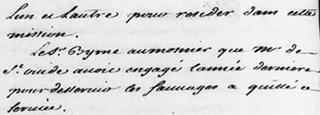 Excerpt translated freely: The interpreter the one called Barthélemy Petit Pas [Petitpas] told us that he also couldn't survive and support his family with the 300.# salary awarded to him. We want to assure monseigneur that the different needs that we have for this service doesn't permit him to be able to attend any other business. This interpreter commanded ships for years which gave him sufficient of what foods. He left everything on the promises that we gave him thus he would have reason to be satisfied. There is no other proper Subject here for this employment, and he is presently at Mirliguech in Labrador where he will spend the winter with missionary for the Indians to teach him the language.
Excerpt translated freely: The interpreter the one called Barthélemy Petit Pas [Petitpas] told us that he also couldn't survive and support his family with the 300.# salary awarded to him. We want to assure monseigneur that the different needs that we have for this service doesn't permit him to be able to attend any other business. This interpreter commanded ships for years which gave him sufficient of what foods. He left everything on the promises that we gave him thus he would have reason to be satisfied. There is no other proper Subject here for this employment, and he is presently at Mirliguech in Labrador where he will spend the winter with missionary for the Indians to teach him the language.In 1735 after the arrival of father Maillard, in a letterH9 Father Saint-Vincent wrote this about the Interpreter for the Indians:
Above translated freely:: It seems to me, I forgot to tell you that I had an interpreter only for the time of three months. With only him could I have learned with my Indians. I hope my brother Maillard will do the same.
The above three documents B35, B36 & B37 spells differently the place where Barthélemy Petitpas spent the winter of 1734 -1735. This is as Mirliguèche and Mirliguech in Labrador which is in the colony of Île Royale (now – Cape Breton Island). Labrador was the Bras d’Or Lake in Cape Breton Island. Today the place Mirliguèche/Mirliguech is referred to as Malagawatch near the Bras d’Or Lake in Cape Breton Island. Furthermore the French had named a village in Acadie (Nova Scotia). Mirliguèche which was renamed Lunenburg.
A documentB38 at LAC (folios 28 - 28v) refers to the village of Mirliguèche in Acadie (Nova Scotia). In this document dated December, 1716 "le nommé Petitpas" related his 80 year old story to Jacques L'Hermitte. Ironically as to the theme of this presentation and its research; there is a possibility that "le nommé Petitpas" telling the story is not Claude Petitpas II but he is one of his brothers. His parents father Claude Petitpas I and mother Catherine Bugaret also had eight sons. The French authority who at one time or another may have referred to Claude Petitpas II's brothers as "le nommé Petitpas"
Of course as discovered during this research some of Claude Petitpas II's sons and his brother Jacques Petitpas' son Nicolas Petitpas was referred to as "le nommé Petitpas":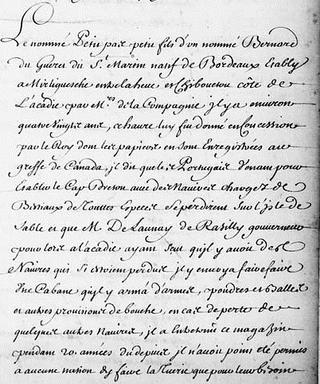
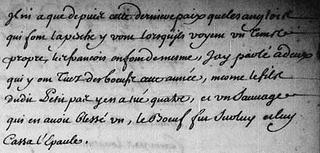 Excerpt translated freely: The one named Petitpas [le nommé Petitpas], the grandson of a man named Bernard du Gueret [Bugaret] dit St. Martin native of Bordeaux who settled at Mirligueche between LaHeve and Chibouctou on the coast of Acadia by the Monsieur of the Company there about eighty years ago, this harbour [harbour at Sable Island] was given to him as a concession by the King whereof the paper are recorded at the Registry of Canada, he said that the Portuguese came to settle in Cape Breton with vessels and loaded with cattle of all species which were lost on Sable Island and governor M. Delaunay of Rassilly for there at Acadia who found out that these were vessels that were lost. He sent and had made a cabin that he armed with weapons, bullets and powders, and other outlet supplies in case of loss of other vessels. He kept this store for 20 years until it had not been allowed any nation so do the killing for only their needs. It has been only since this last peace that the English who fish there when they see a proper time[weather]. The François [French] do the same, I talked to two who killed cattle this year, even the said Petitpas' son killed four of them, and an Indian who wounded one, the steer was on him and broke his shoulder.
Excerpt translated freely: The one named Petitpas [le nommé Petitpas], the grandson of a man named Bernard du Gueret [Bugaret] dit St. Martin native of Bordeaux who settled at Mirligueche between LaHeve and Chibouctou on the coast of Acadia by the Monsieur of the Company there about eighty years ago, this harbour [harbour at Sable Island] was given to him as a concession by the King whereof the paper are recorded at the Registry of Canada, he said that the Portuguese came to settle in Cape Breton with vessels and loaded with cattle of all species which were lost on Sable Island and governor M. Delaunay of Rassilly for there at Acadia who found out that these were vessels that were lost. He sent and had made a cabin that he armed with weapons, bullets and powders, and other outlet supplies in case of loss of other vessels. He kept this store for 20 years until it had not been allowed any nation so do the killing for only their needs. It has been only since this last peace that the English who fish there when they see a proper time[weather]. The François [French] do the same, I talked to two who killed cattle this year, even the said Petitpas' son killed four of them, and an Indian who wounded one, the steer was on him and broke his shoulder.Short Summary to Salute Claude II's and His Eldest Son Barthélemy's Lives
It is hoped that the researched information here especially helps to recognize and salute Claude Petitpas II's and his eldest son Barthélemy's lives.Claude Petitpas II was an Acadian who became a Mi'kmaq by marriage. He married Marie-Thérèse, a Mi'kmaq Native American. They had three daughters and four sons who appear on the 1708 Indian census. Then back in 1708, Françoise Petitpas was 2 years old, Marie Louise Petitpas 7, Judith Petitpas 15, Isidore Petitpas 5, Joseph Petitpas 9, Paul Petitpas 13 and Barthélemy Petitpas 21.
The four sons from Claude Petitpas II's second marriage to Françoise Lavergne (La Vergne) names were Jean Petitpas, Jacques Petitpas, Louis Petitpas & Joseph Petitpas. Their ages were about 10, 8, 6 and 1 when Claude Petitpas II died in 1732.
Claude Petitpas II and his first four sons were very well liked and influential within the Mi'kmaq community. This was of great concern to France and an apparent threat to their colonial interests. Isidore Petitpas was exiled in 1722, Joseph Petitpas and Paul Petitpas in 1728 by France.
Eventually Claude Petitpas II moved to the French colony of Île Royale (Cape Breton Island) which was created by France after the Treaty of Utrecht of 1713. The exile of his two sons in 1728 put a stop to Claude Petitpas II’s wish in returning to Nova Scotia to be there with his people, the Mi'kmaq. Barthélemy moved to the French colony of Île Royale a short time after the Treaty of Utrecht. Claude Petitpas II became France's Official Interpreter for the Indians. After his death in 1732 his son Barthélemy was appointed. According to France, Barthélemy Petitpas had a perfect command of the Mi'kmaq and the Amalécite [Malecite] languages, and had all the qualities necessary to be a good interpreter. Of course also, he was fluent in English and French. Barthélemy was captured in 1745 by Great Britain and its Colonial force. He died (was put to death according to Father Maillard) in a Boston dungeon in the month of January of the year 1747.
François BigotA19 was the financial commissary of Île Royale. Later in his career he was appointed the intendant of New France. In a letterB39 dated September 7, 1748 to the Minister, he wrote (folio 283) this regarding Barthélemy Petitpas:
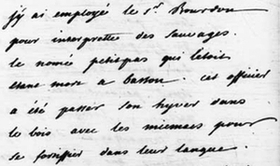 Excerpt translated freely: I have employed S. Bourdon for Interpreter for the Indians, the one named Petitpas who was before being dead at Boston. This officer spent his winter in the woods with the Micmacs to strengthen himself in their language.
Excerpt translated freely: I have employed S. Bourdon for Interpreter for the Indians, the one named Petitpas who was before being dead at Boston. This officer spent his winter in the woods with the Micmacs to strengthen himself in their language.In the last paragraph of Barthélemy's biography it says: “The final 12 years of Barthélemy Petitpas’s life remain obscure. We know nothing of the direction of his influence among the Micmacs, nor of his relations with the colonial authorities.”. Surely from the information presented in this research for "Les Nommés Petitpas"; we know that Barthélemy Petitpas’ life was not obscure for the final 12 years of his life. He was France's official Interpreter for the Indians in the colony of Île Royale.
Barthélemy served in a continuous ardent and very loyal way for France’s endeavor in North America. This native man from Mi’kma’ki (Acadie), Barthélemy Petitpas paid the ultimate price by spending the last months of his life in a dungeon. This was in a cruel biased manner at the hands of Great Britain and its Colonial force in the month of January of the year 1747.
In respect to their lives and stories, their biographies and the historical facts written about them and all "Les Nommés Petitpas" should be an accurate reflection of what actually transpired.
Author - Un Nommé Petitpas
© 2008
I remember - Je me souviens

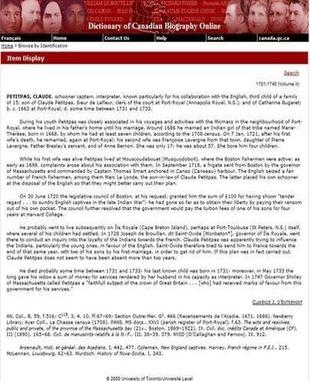
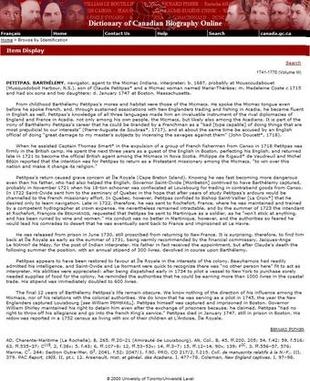
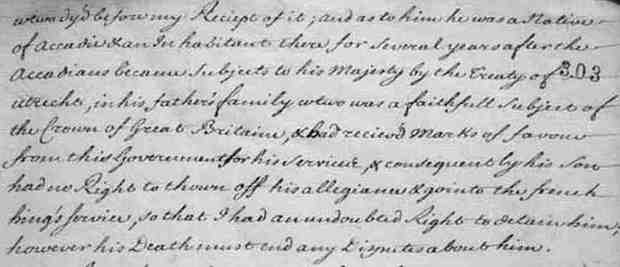
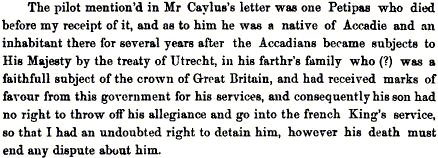

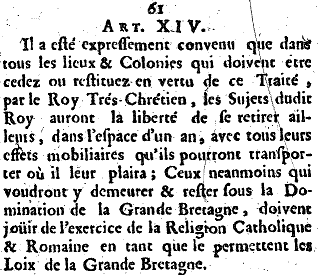
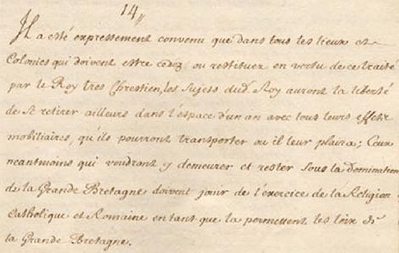
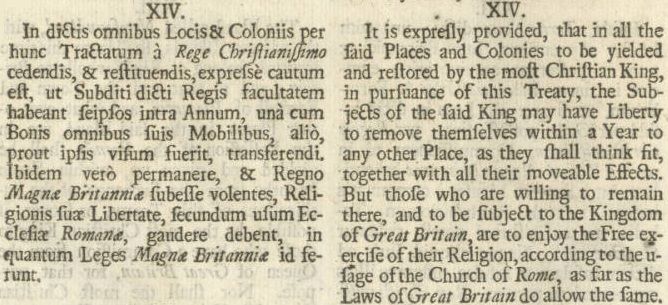

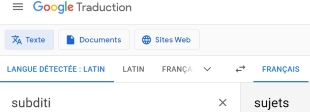





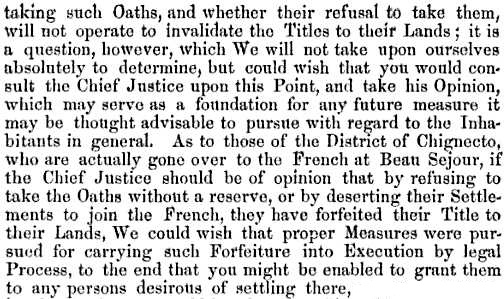


![Hyperlinked excerpt of the cover page from an Online 1727 document from LAC about le nommé [ the one named] Petitpas a son of an inhabitant from Acadie](img-r/cov-1727.jpg)
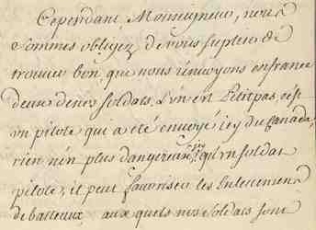
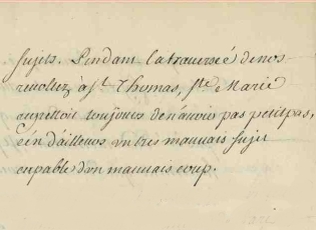



![Excerpt of an electronic document received from the Newberry Library. It is from a copy of page 17 of the November 1708 Indian Census of Acadie. It is the 30th family which shows the Petitpas' and their ages. It is listed as follows: Claude petit pas [Petitpas] 45, Marie Thereze [Marie-Thérèse] 40, Berthelemy [Barthélemy] 21, Paul 13, Joseph 9, Isidor [Isidore] 5, Judie [Judith] 15, Marie Louise 7 and Françoise 2](img-r/p17e.jpg)
![Hyperlinked small image to a larger page view at this Website of a electronic document received from the Newberry Library. It is page 17 of the November 1708 Indian Census of Acadie which reads 'Sauvages de Mouscoudabouet' for the page heading. The 30th family shows the Petitpas' and their ages. It is listed as follows: Claude petit pas [Petitpas] 45, Marie Thereze [Marie-Thérèse] 40, Berthelemy [Barthélemy] 21, Paul 13, Joseph 9, Isidor [Isidore] 5, Judie [Judith] 15, Marie Louise 7, Françoise 2](img-r/p17s.jpg)
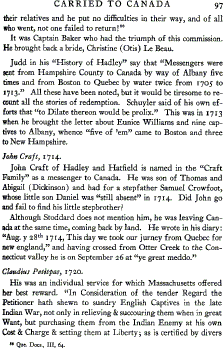
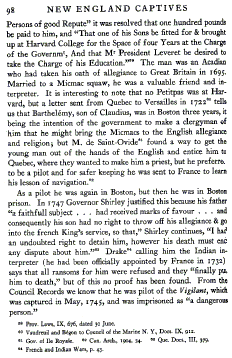
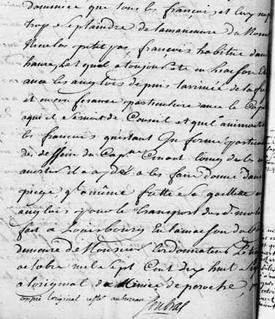

![Hyperlinked excerpt from an Online document at LAC - Folio 73 (item 3) refers to the one named LaSonde, the son in-law of Petitpas [Claude Petitpas II] & folio 74 (item 5) refers to the one called Petitpas [Nicolas Petitpas]](img-r/item3.jpg)
![Hyperlinked excerpt from an Online document at LAC, folio 73 (item 3) is refers to the one named LaSonde, the son in-law of Petitpas [Claude Petitpas II] & folio 74 (item 5) refers to the one called Petitpas [Nicolas Petitpas]](img-r/item5.jpg)
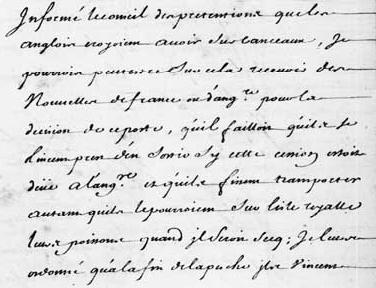
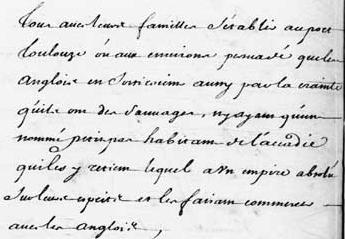
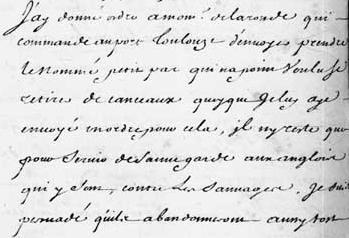
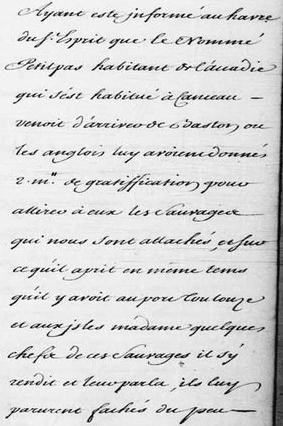
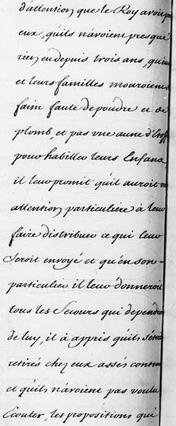
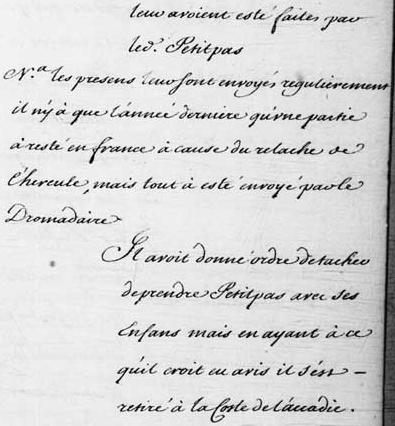
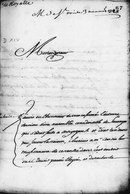
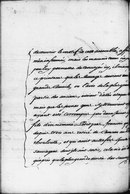
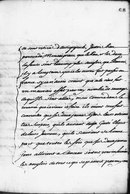
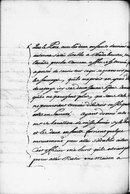
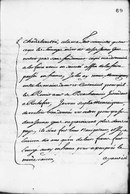
![Hyperlinked to an Online document at LAC relating to a petits pas [Petitpas] family](img-r/f108.jpg)
![Hyperlinked to an Online document at LAC relating to the one named Petitpas [Claude Petitpas II] and his son-in-Law LaSonde](img-r/f38.jpg)
![Hyperlinked to an Online document at LAC relating to the one named Petitpas [Claude Petitpas II] and his son-in-Law LaSonde](img-r/f38v.jpg)
![Hyperlinked to an Online document at LAC relating to the one named Petitpas [Claude Petitpas II] and his son-in-Law LaSonde](img-r/f39.jpg)
